
2, 2025 - AUGUST 8, 2025


2, 2025 - AUGUST 8, 2025

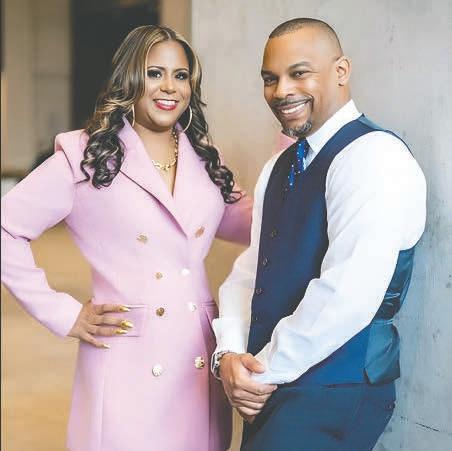







In celebration of National Black Business Month, this week the AFRO shines a light on the trailblazing Black entrepreneurs who have broken barriers, uplifted communities and forged new paths in business. Keep this edition handy to explore the stories behind the success, innovation and resilience powering Black-owned enterprises across the nation.

Event to focus on growth, visibility and solutions for Black entrepreneurs
Event to focus on growth, visibility and solutions for Black entrepreneurs
The AFRO will proudly present its annual Black Business Matters Expo on Thursday, Aug. 14, from 4:30 – 7:00 p.m. at the Reginald F. Lewis Museum in Baltimore. Free registration is available on the AFRO’s event platform, afrotix.live.
The AFRO will proudly present its annual Black Business Matters Expo on Thursday, Aug. 14, from 4:30 – 7:00 p.m. at the Reginald F. Lewis Museum in Baltimore. Free registration is available on the AFRO’s event platform, afrotix.live.
“This is about legacy and leadership,” said Lenora Howze, executive director of the AFRO. “We’re not just hosting an event, we’re building a platform where Black-owned businesses and entrepreneurs can find information, inspiration and opportunity to thrive.”
“This is about legacy and leadership,” said Lenora Howze, executive director of the AFRO. “We’re not just hosting an event, we’re building a platform where Black-owned businesses and entrepreneurs can find information, inspiration and opportunity to thrive.”
Correction:

reach into new markets.
Month, providing a space for seasoned Black entrepreneurs and new business owners to learn, network and grow This event features two primary programmatic tracks:
The Expo will highlight National Black Business Month, providing a space for seasoned Black entrepreneurs and new business owners to learn, network and grow This event features two primary programmatic tracks: The Emerging Track, for newer business owners, designed to lay a strong foundation, help them grow with confidence and expand their
The Expo will highlight National Black Business
The Emerging Track, for newer business owners, designed to lay a strong foundation, help them grow with confidence and expand their

Your History • Your Community • Your News The Afro-American Newspapers afro.com
Your History • Your Community • Your News The Afro-American Newspapers afro.com
Frances Murphy Draper John J. Oliver Jr.) Benjamin Murphy Phillips IV - Kevin E. Peck Dana Peck
Frances Murphy Draper John J. Oliver Jr.) Benjamin Murphy Phillips IV - Kevin E. Peck Dana Peck
Receptionist - Wanda PearsonDirector of Operations
reach into new markets. The Accelerator Track, designed for seasoned entrepreneurs who are ready to scale their business ventures, deepen their impact and reach new heights.
The Accelerator Track, designed for seasoned entrepreneurs who are ready to scale their business ventures, deepen their impact and reach new heights.
Panels, sponsors and corporate partners will showcase tangible tools for wealth building, financial literacy and business
Panels, sponsors and corporate partners will showcase tangible tools for wealth building, financial literacy and business
development. The feedback from previous events has been overwhelmingly positive from entrepreneurs in a wide range of industries and stages of business development.
development. The feedback from previous events has been overwhelmingly positive from entrepreneurs in a wide range of industries and stages of business development.
“We constantly hear how valuable the networking and sponsorship access has been,” Howze said. “People walk away with real connections and strategies they can use.”
“We constantly hear how valuable the networking and sponsorship access has been,” Howze said. “People walk away with real connections and strategies they can use.”
The AFRO is the oldest Black-owned media company in the DMV region and one of the oldest in the nation.
Now moving into year 133, it continues its mission to inform, inspire and empower the Black community through journalism and culturally relevant events.
The AFRO is the oldest Black-owned media company in the DMV region and one of the oldest in the nation. Now moving into year 133, it continues its mission to inform, inspire and empower the Black community through journalism and culturally relevant events.
For more information, contact Lenora
at lhowze@afro.com or 410-554-8271.
For more information, contact Lenora Howze at lhowze@afro.com or 410-554-8271.
By Andrea Stevens AFRO Staff Writer astevens@afro.com
By Andrea Stevens AFRO Staff Writer astevens@afro.com
For many Black entrepreneurs, the road to fulltime business ownership is marked by both systemic challenges and strategic breakthroughs. While success is possible, it often hinges on access to contracts, collaboration and what one expert calls “belief capital.”
For many Black entrepreneurs, the road to fulltime business ownership is marked by both systemic challenges and strategic breakthroughs. While success is possible, it often hinges on access to contracts, collaboration and what one expert calls “belief capital.”
Andrè DraperDirector of Finance Bonnie DeanesLenora Howze - lhowze@afro.com
Receptionist - Wanda PearsonDirector of Operations Andrè DraperDirector of Finance Bonnie DeanesLenora Howze - lhowze@afro.com
Diane W. HockerEditorial Alexis TaylorAma Brown-Parson - Savannah Wood-
Diane W. HockerEditorial Alexis TaylorAma Brown-Parson - Savannah Wood-
Andrè DraperFrances L. Murphy II)
Andrè DraperFrances L. Murphy II)
Director of Operations - Andrè Draper -
Director of Operations - Andrè Draper -

Omar Muhammad, director of the Entrepreneurial Development and Assistance Center at Morgan State University, and Devon Corbin, director of the United Negro College Fund’s (UNCF) Center for Innovation and Entrepreneurship, offer insight into the realities many Black founders face when starting businesses.
Omar Muhammad, director of the Entrepreneurial Development and Assistance Center at Morgan State University, and Devon Corbin, director of the United Negro College Fund’s (UNCF) Center for Innovation and Entrepreneurship, offer insight into the realities many Black founders face when starting businesses.
“Success really depends on the individual, the business model and whether they have contracts or paying customers early on,” said Muhammad, a Baltimore native and lifelong entrepreneur. “For those with contracts—whether government or corporate—it might take three months to go full time. For others, it may take several years.”
“Success really depends on the individual, the business model and whether they have contracts or paying customers early on,” said Muhammad, a Baltimore native and lifelong entrepreneur. “For those with contracts—whether government or corporate—it might take three months to go full time. For others, it may take several years.”
Muhammad stressed that identifying paying customers early is crucial. Many entrepreneurs, he said, make the mistake of assuming friends and family will sustain their business.
Muhammad stressed that identifying paying customers early is crucial. Many entrepreneurs, he said, make the mistake of assuming friends and family will sustain their business.
“It’s not long-term,” Muhammad said. “Access to paying customers is often more valuable than startup capital.”
“It’s not long-term,” Muhammad said. “Access to paying customers is often more valuable than startup capital.”
Corbin agrees. Based on research and experience with diverse founders, he believes systemic barriers, including economic, market, cultural and institutional inequities continue to limit success for Black and Brown entrepreneurs.
Corbin agrees. Based on research and experience with diverse founders, he believes systemic barriers, including economic, market, cultural and institutional inequities continue to limit success for Black and Brown entrepreneurs.

Devin Corbin, director of the United Negro College Fund’s (UNCF) Center for Innovation and Entrepreneurship, believes systemic barriers, including economic, market, cultural and institutional inequities limit Black entrepreneurs.
Devin Corbin, director of the United Negro College Fund’s (UNCF) Center for Innovation and Entrepreneurship, believes systemic barriers, including economic, market, cultural and institutional inequities limit Black entrepreneurs.

“Most Black entrepreneurs don’t make it past 18 months,” Corbin said. “Very few leave their jobs until they’ve had at two to three profitable
“Most Black entrepreneurs don’t make it past 18 months,” Corbin said. “Very few leave their jobs until they’ve had at least two to three profitable
years. Some continue working full time even after five years in business.”
years. Some continue working full time even after five years in business.”
To change that trajectory, Corbin leads a comprehensive
To change that trajectory, Corbin leads a comprehensive
training program through UNCF that mirrors accelerator and incubator models. His curriculum walks participants through every stage of venture creation, from problem identification and leadership to business plan development and pitching.
training program through UNCF that mirrors accelerator and incubator models. His curriculum walks participants through every stage of venture creation, from problem identification and team leadership to business plan development and pitching.
Classes include “Intro to Entrepreneurship,” “Soft Skills and DEI,” “Leadership and Teams” and “Risk/Reward Design Thinking.” By the end, participants have a business plan, a value proposition, a prototype or minimum viable product (MVP) and real market feedback.
Classes include “Intro to Entrepreneurship,” “Soft Skills and DEI,” “Leadership and Teams” and “Risk/Reward Design Thinking.” By the end, participants have a business plan, a value proposition, a prototype or minimum viable product (MVP) and real market feedback. Muhammad also emphasized the importance of collaboration. While many entrepreneurs want to run businesses solo, he argues that partnerships and advisory boards are often what differentiate those who succeed from those who don’t.
Muhammad also emphasized the importance of collaboration. While many entrepreneurs want to run businesses solo, he argues that partnerships and advisory boards are often what differentiate those who succeed from those who don’t.
“I’ve seen businesses fail because everyone wanted to be the head chief,” Muhammad said. “But when entrepreneurs build teams or even merge ventures, they can go after bigger customers and more revenue.” Both experts agree that programs, mentors and early investment are helpful—but belief is the foundation.
“I’ve seen businesses fail because everyone wanted to be the head chief,” Muhammad said. “But when entrepreneurs build teams or even merge ventures, they can go after bigger customers and more revenue.” Both experts agree that programs, mentors and early investment are helpful—but belief is the foundation.
Corbin emphasized the critical role of confidence and conviction in a founder’s journey.
Corbin emphasized the critical role of confidence and conviction in a founder’s journey.
“Belief capital is the best support a founder can have,” Corbin said. “If a founder truly believes in their vision, others—investors, customers, mentors—will too.” As more institutions focus on inclusive entrepreneurship, both Muhammad and Corbin say the key lies in practical skills, strategic partnerships and a community mindset.
“Belief capital is the best support a founder can have,” Corbin said. “If a founder truly believes in their vision, others—investors, customers, mentors—will too.” As more institutions focus on inclusive entrepreneurship, both Muhammad and Corbin say the key lies in practical skills, strategic partnerships and a community mindset.
“We can build economic empowerment in our communities,” said Muhammad. “But we have to do it together.”
“We can build economic empowerment in our communities,” said Muhammad. “But we have to do it together.”

mogul Reginald F. Lewis remembered by mantra, ‘Keep going, no matter what’
By D. Kevin McNeir Special to the AFRO kmcneir@afro.com
History was made in 2005 when Baltimore’s Inner Harbor became the home of the Reginald F. Lewis Museum of Maryland African American History and Culture – established to preserve the experiences, contributions and culture of the African diaspora with an emphasis on the state of Maryland.
Two decades later, the Lewis Museum now has on display a groundbreaking exhibit, “Titan: The Legacy of Reginald Lewis,” which salutes the museum’s namesake and highlights the business tycoon’s roots, which can be traced back to Baltimore, the city in which he was born and raised. And while Lewis’s self-confidence, ingenuity and uncanny business acumen would prove instrumental to him becoming America’s first Black billionaire, those who knew him well remember him as a man committed first to his family and friends.
“I was only 13 when he died, but I have so many positive memories of him that I could talk about my uncle all day long,” said J. Russell Fugett, whose father, Jean S. Fugett Jr., took over as chairman and CEO of TLC Beatrice International Holdings Inc., upon the death of his older brother. Lewis died of brain cancer in 1993 at the age of 50.
“He loved family time, and whenever he could sneak away from New York City, he’d come to Baltimore and take me and my cousins into the yard where we’d play toss football,” Fugett said. “A lot of people don’t know that he was vice president of his class and a star football player at Dunbar High, where he led his team to victory in one of the first games between a Black and a White team. Local news covered the game with many predicting violence, but the game went off without a hitch. And my uncle – always cool, calm and confident – led his team to victory.”
Fugett reflected on one special Easter Sunday which he said he’ll always remember.
“He stepped out of his car and gathered all of


Street’s first African-American law firm.
As he shifted his focus to corporate law and structuring investments in minority-owned businesses, he continued to achieve greater success, serving as special counsel to Fortune 500 companies like General Foods and Equitable Life (now AXA). He also served as counsel to the Commission for Racial Justice, based in New York, and represented The Wilmington 10.
Lewis moved to the other side of the table, establishing the TLC Group, L.P. in 1983. The next year he acquired and became chairman of the struggling McCall Pattern Co. Within a year, Lewis had turned it around, leading the company to two of its most profitable years in its 113-year history. In 1987, he sold the company at a 90-1 return, providing a windfall for investors.
As an attorney and business owner, Lewis faced his fair share of setbacks, presumably due to the color of his skin, as Butch Meily, his former public relations strategist, attests. But through his persistence and confidence in his own abilities, Lewis eventually overcame racism and became the first African American to close a near-billion-dollar leveraged buyout deal of an overseas asset – TLC Beatrice International – emerging as a business pioneer, philanthropist and titan.
“Reginald Lewis changed my life, and I would say countless others’ lives, in ways that are difficult to adequately describe,” said Meily, who recently published his memoirs, “From Manila to Wall Street.” The book chronicles the six years he spent with his mentor and employer prior to his death.
Fugett said his uncle mastered the ability of managing work and family before it even became a required skill among professionals.
“My father and my grandparents always described my uncle as ‘bold,’ ‘fearless’ and ‘intense,’” he said. “Somehow, he managed to keep the demands of his business and his desire to enjoy special times with his family separate and remained committed to doing his best in both worlds.
“But what sticks out in my mind is how he was a visionary,” said Fugett. “That’s a word I don’t
his nieces and nephews around him,” he said. “Then, he asked us how we were doing in school, told us to always respect our parents and then gave each of us a crisp $50 bill. I had never had that much money in my hands in my entire life.”
The slow and steady rise to success
Born on Dec. 7, 1942, Lewis grew up in an East Baltimore middle-class neighborhood. Early signs of his business acumen were apparent when at the age of 10, Lewis set up a delivery route to sell the AFRO-American Newspaper. After building the business from 10 customers to more than 100 in two years, he sold the route at a profit.
A three-sport athlete and team captain for all three at Dunbar High School, he accepted a football scholarship at Virginia State University, from which he graduated in 1965 with a degree in political science. A gridiron injury cut his brief football career short. But it also gave him more time to focus on school and work.
In the summer of 1965, his impressive participation in a program at Harvard University that introduced Blacks to the study of law, led to him being invited to enroll, even though he had not applied for admission. He completed his juris doctorate at Harvard Law School in 1968 and began his career practicing corporate law for a prestigious New York law firm. Two years later, he, along with several others, formed Wall
“He was a driven man who worked extremely hard and often seemed consumed by his pursuits in business,” Meily added. “I was fortunate to accompany him on his journey to achieve the American Dream. But more than that, I was lucky enough to see how much he loved his friends and family and cherished their time together.”
Meily referred fondly to a phrase that Lewis often quoted to him and to others no matter where he traveled: “Keep going, no matter what.”
Terri Lee Freeman, president of the Reginald F. Lewis Museum, led a Juneteenth commemoration earlier this summer that included a special program about the life and legacy of Lewis.
Meily served as a featured guest during which he and several Broadway actors presented a live performance of excerpts taken from his book.
“We invited Butch Meily, one of [Reginald Lewis’s] top advisors, to join us and to share memories about their time together,” Freeman said. “It was a perfect addition to the day’s many activities and was well received by an inquisitive and diverse audience of around 150 people who were enthralled by the presentation.”
Freeman said that while Lewis died in 1993, people can still learn a lot from his legacy and the unprecedented hurdles he faced and overcame in half a century.
“His message was rooted in his profound belief that anything can be achieved through hard work and persistence,” she said. “As a son of East Baltimore, one thing stands out: Reginald Lewis was a self-made man. He worked hard to accomplish his goals, harder than most people can imagine.”
often hear associated with him–but it should be. He saw and imagined things that most people never could. That’s part of what made him special. I really hope his story will continue to inspire other African Americans to think globally and, like him, become visionaries.”
The “Titan: The Legacy of Reginald Lewis” exhibit will be available to the public inside of the Reginald F. Lewis Museum of Maryland African American History and Culture, located at 830 East Pratt St., through April 2026.



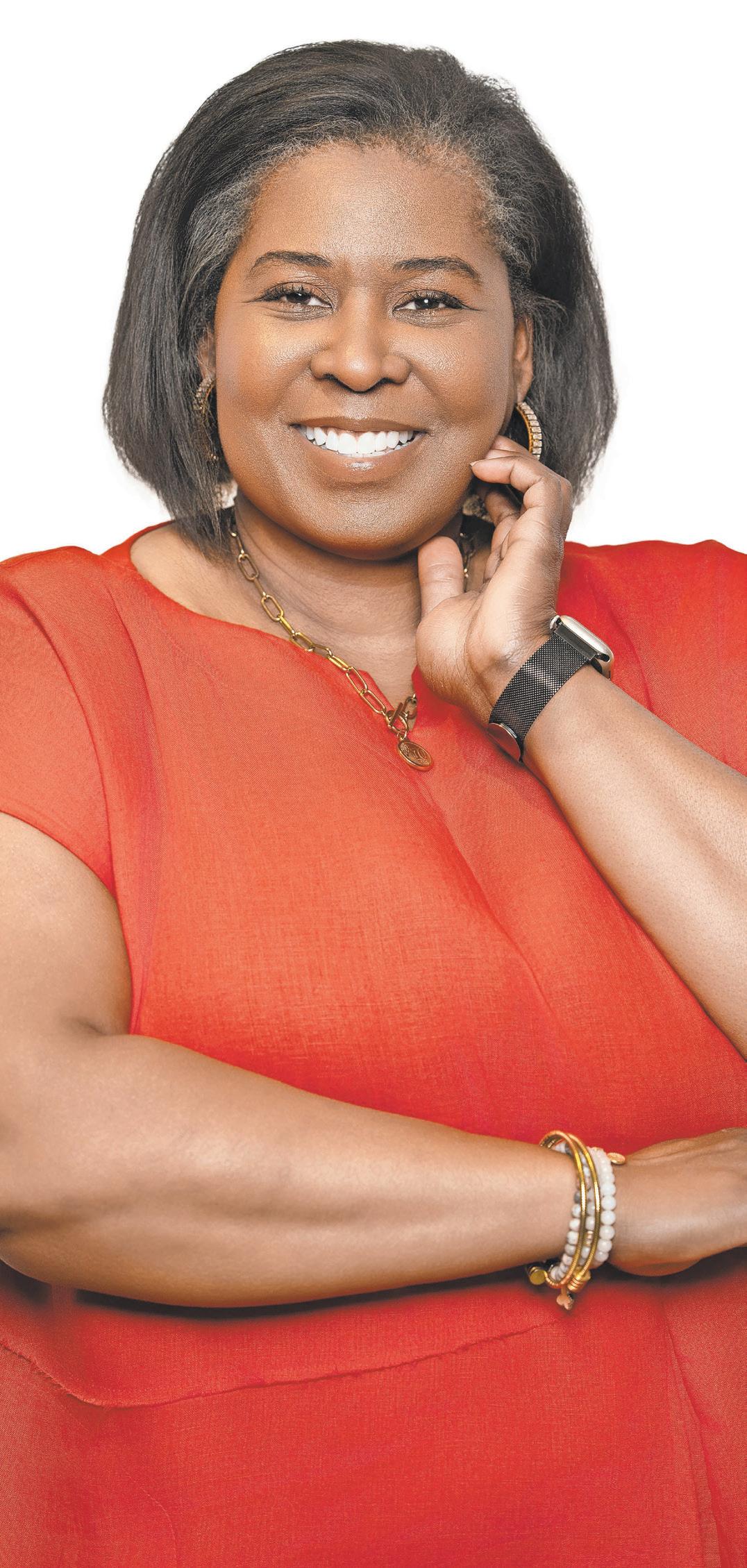
By Megan Sayles AFRO Staff Writer msayles@afro.com
While some entrepreneurs set out early to become their own boss—or inherited a family business—others took the leap to launch their own enterprise after years of working a 9-to-5 job.
Tiffany Veney, owner of Madison Street Build and Design Group, and Leslie Frelow, owner of The Wine Concierge, took the latter path.
Though Veney didn’t open her business until 2019, her interest in design and construction began when she was a child. She recalled constantly rearranging the furniture in the small bedroom she shared with her sister.
“As I got into middle school, I thought about construction and building things but it was such a male-dominant industry that I felt like it was too masculine for me,” said Veney. “Then, as a first-generation college student, I wanted to choose what felt like a safer route.”
The construction field is not only primarily male-dominated, it’s also largely led by White professionals. Notably, just 11.2 percent of all construction workers were women in 2024, according to the Bureau of Labor Statistics. The agency also reported
Do

that a mere 6.5 percent of all construction workers were African American in 2024.
Veney, a Baltimore native, ultimately decided to study finance at Bowie State University. Upon graduation, she worked as a mortgage-backed securities analyst for a few years before becoming a mother of two and staying at home to take care of the children.
When it came time for her to re-enter the workforce, Veney knew she didn’t want to return to her former career. She spent a couple of years as a real estate agent, but it was her introduction to project management that laid the groundwork for Madison Street Build and Design Group.
“I was overseeing some rehab projects, and that’s when I realized that I wanted to be a part of this world,” said Veney.
She continued with project management for about two years, but she became frustrated with the lack of direct control over the construction teams she was responsible for.
“I decided I was going to start my own company so I could have more control over the finished product timelines and more say-so in the projects,” said Veney. “I initially thought that I would just be doing some small interior design projects and little things here and there, but the business actually exploded as soon as I put it out there on social media. I didn’t even do any major marketing.”
Today, Madison Street Build and Design Group offers commercial build-outs, residential remodels and interior design services. It also creates 3D renderings for clients who might not require construction but need help visualizing their projects.
Veney’s favorite project so far has been helping the Reginald F. Lewis Museum of Maryland African American History and Culture finish its “Lynching in Maryland” exhibit, which opened in 2024.
“I never would have pictured myself working in the museum, doing construction. I also grew up in the neighborhood. As a kid, I walked through that area and passed that building,” she said. “To be a part of its history in installing one of their exhibitions was a full circle moment of me putting the work in and letting my path lead me into doing things I couldn’t have imagined.”
For Frelow, it was finances and fear that made her hesitant to start her own business.
The Landover, Md. native spent much of her career in public policy and administration, working for the state of Maryland and managing a multimillion-dollar broadband access fund at a national not-for-profit.
But, eventually, she realized that chapter of her career had run its course.
While attending a wine festival, she saw a posting for culinary school and remembered that she once had a passion for food and drink. However, a high school career counselor squashed the dream, telling her she wouldn’t earn enough

money to support herself.
In 2013, Frelow began exploring wine as a side hustle and established Vino 301 Wine Concierge. On weekends, she would rent a car and take people on tours of Maryland vineyards—while still working full-time. When the Covid-19 pandemic hit and in-person tours were no longer possible, she pivoted to virtual tastings.
That transition led to the launch of The Wine Concierge in late 2020. With aid from a Covid relief loan, Frelow was finally able to turn her side hustle into a full-time venture. She ultimately decided it was her excitement about the business’ possibilities that pushed her to quit her day job.
“When I thought about continuing in my situation it was so unsettling, and I saw so much potential and a niche that wasn’t being fulfilled,” said Frelow. “We have an underlying mission to support small, Black businesses, and I saw that as my social calling to do.”
The Wine Concierge also runs a quarterly wine club called, “Shades of Vino,” and a number of wine tasting events and festivals.
“Don’t be afraid to try things on a small scale and see what they’re like before the big leap.”
For people who find themselves daydreaming about starting their own business while working a traditional job, Frelow advised that they find a mentor in the industry they want to enter. That person may have insight that can be especially helpful to budding entrepreneurs as they’re starting out.
“Intern and shadow people because it may be something that you’re interested in and seem exciting, but after you do it for a while you may realize it’s just a hobby and not a business,” said Frelow. “Don’t be afraid to try things on a small scale and see what they’re like before the big leap.”
An e-commerce platform, The Wine Concierge features a variety of wines from boutique vineyards that are produced by women and minority makers. The goal is to give small, underrepresented brands exposure to a vast customer base without burdening them with distribution costs.

By Megan Sayles AFRO Staff Writer msayles@afro.com
Huddled around a table in Baltimore Unity Hall on July 23, a group of young girls gripped their paintbrushes, carefully crafting their own statement necklaces and chatting amongst themselves as part of the Beadly Speaking Kidz Jewelry Camp. Their instructor, Dyon Davidson, watched nearby, ready to lend a helping hand or offer encouragement as the girls worked on their designs.
Davidson, a former educator, has been making jewelry for nearly two decades. She started the camp—a namesake of her jewelry business—in 2022. The camp provided an opportunity for Davidson to not only teach young people about the fundamentals of jewelry-making, but to educate them on entrepreneurship.
“I feel like I’m healing my inner child by working with the kids in this way,” said Davidson. “It might seem selfish in a way, but if I would have had this kind of experience at that age, I think it would have set me up for a different future.”
Each week, campers participate in a different unit, learning how to handcraft earrings, necklaces, rings and bracelets with materials ranging from beads, to wire, to wood. Alongside the technical instruction, they participate in confidence-building activities, like self-affirmations.
This year, Davidson also added a financial literacy component to the camp.
SECU Maryland did a presentation for camp participants and helped them open up bank accounts.
“They [helped] them start it with a couple of dollars,” said Davidson. “On top of that, they’re going to make money at our closing marketplace where they’ll sell their jewelry, which they can then put into that account.”
The marketplace, which will take place at Baltimore Unity Hall on Aug. 2, will enable the girls to showcase all of their jewelry and sell items directly to the community. It’s also an opportunity for them to experience what it’s like to be an entrepreneur.
“We want to teach them to avoid spending all of their earnings on shopping and to create

a culture where they know they have to put some of their earnings back into buying more materials if they really want to start a jewelry business,” said Davidson. “It’s small things like that that will help them with their finances as they get older.”
Makayla Pierre first participated in the camp last year, but she said her aunt introduced her to Davidson in 2023. The 15-year-old had recently started her own jewelry business and wanted to learn how to add to her collection.
Her favorite material to work with has always been beads, but the camp has taught her how to use wire.
“I didn’t know how to do a lot with wire before the camp,” said Pierre. “I’ve learned how to make a coffee cup, spiral and a lot of geometric shapes.”
She also said she’s improved her painting.
“Last year, I painted pieces like these necklaces, but I didn’t really like them,” said Pierre.

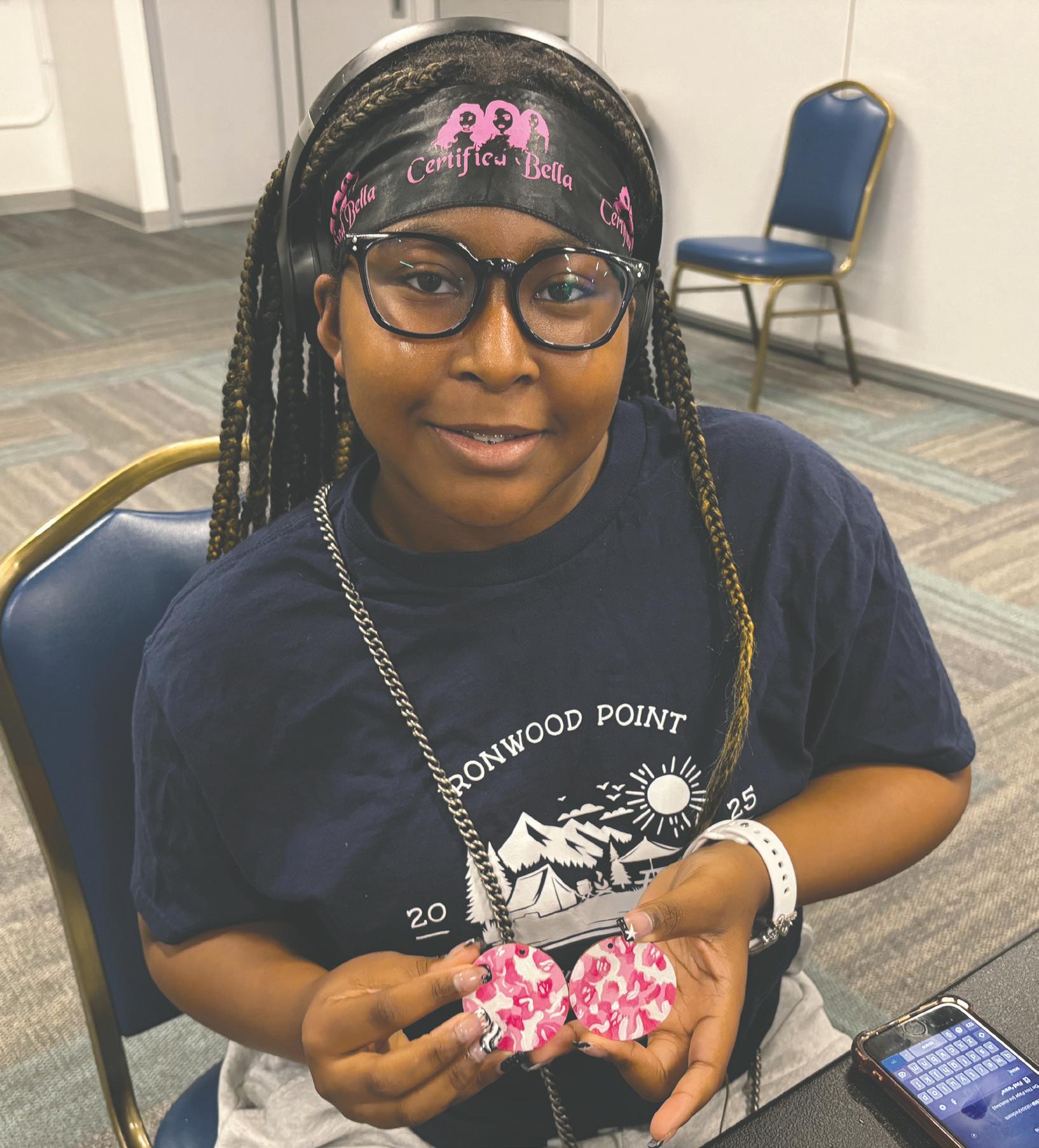
“This year, they are probably my best pieces.”
Twelve-year-old Bre’asia Junior said she’s made more than 30 pieces of jewelry, including rings, earrings and bracelets, since starting the camp. Every day she proudly sends her mother photos of her designs.
“My mom wants me to ask Ms. Dyon about where she gets the supplies from so I can start my own business after camp,” said Junior.
She said the camp has also helped her to become more comfortable with sharing her voice.
“Ms. Dyon’s helped me with so many things. I’m normally a quiet person, but she’s helped me speak up and talk to more people,” said Junior. “When I came I only knew one person, but now I have so many people I can talk to.”


By Andrea Stevens AFRO Staff Writer astevens@afro.com
From holistic health ventures to tech startups, a new wave of Black business owners are proving that entrepreneurship is far from a monolith.
Tonya Pledger, founder of Love Your V by T, represents a growing movement in wellness entrepreneurship that elevates Black women’s health. Her business, which began in her home, offers holistic yoni steaming and now operates out of three locations in the Washington, D.C., Maryland and Virginia area.
of benefits, the act of steaming with herbs is believed to promote healing, improve circulation, ease menstrual discomfort and support reproductive health.
“Yoni steaming is a natural way to support women’s health and healing,” Pledger said. “It helps you relax physically, mentally and spiritually, and it can be a powerful tool for womb wellness.”
Her personal experience inspired her to share the benefits of yoni steaming and encourage other women to explore holistic approaches to their health.
sooner, I may have saved what God gave us to maintain life.”
Pledger transitioned from working full-time to running her business independently, a shift she describes as both spiritual and strategic.
“The biggest shift for me was realizing that everything fell on me…It was me and God,” she said. “When I wrote my vision down and made it clear, everything started to fall together.”

“When I wrote my vision down and made it clear, everything started to fall together.”
According to the Cleveland Clinic, yoni steaming is an ancient holistic practice where a woman sits or squats over a bowl of steaming water with herbs. Though researchers say there is no concrete evidence
“Going through my own journey has helped me to grow to love and embrace women’s health and natural wellness,” Pledger said. “One of the mistakes I made was getting a hysterectomy too soon, not knowing what I know now. If I had been involved in this
On a different end of the entrepreneurial spectrum, Kiante Bush is the founder and CEO of Venture for Them, a tech-focused startup accelerator designed to uplift entrepreneurs from historically Black colleges and universities (HBCUs). His mission is to connect young Black founders with funding, mentorship and visibility in a tech world that often overlooks them.
“Our main goal is to support early-stage HBCU entrepreneurs...and connect them to venture capital, C-suite mentors and non-dilutive funding,” Bush said. “I grew up around entrepreneurs, and I wanted to create a space where I could invest in those around me too.”
Bush says learning to lead collaboratively was a game changer.
“I had to learn how to let

go of control...to let others in on the vision,” he said. “That helped expand the business significantly.”
As Bush and his team grow the venture, they’ve had to make strategic decisions about who they work with.
“All money isn’t good money,” he said. “Some partnerships that didn’t work out ended up being protection from organizations that weren’t truly aligned with our mission.”
Meanwhile for Anastasia Jackson and Jenaba Sow, co-founders of the education tech startup WeNite, entrepreneurship is about transforming broken systems. Their company partners with HBCUs and emerging research institutions to help modernize outdated processes using digital solutions.
Jackson’s experience as a transfer student at Howard University — where administrative failures left her temporarily homeless — shaped the company’s mission.
“That experience made me realize this was bigger than me,” she said. “Technology could lift the burden from both students and overworked faculty.”
The co-founders said staying grounded in their mission has been their greatest challenge and reward.
“In the startup space, a lot of people are focused on exiting—not impact,” Sow said. “ For us, it’s always been about building with community and for community.”
Together, these founders are reshaping how entrepreneurship looks and feels in Black communities. They are not only solving problems—they are reimagining systems.
“We’re building a legacy,” Plegder said. “And we’re doing it our way.”



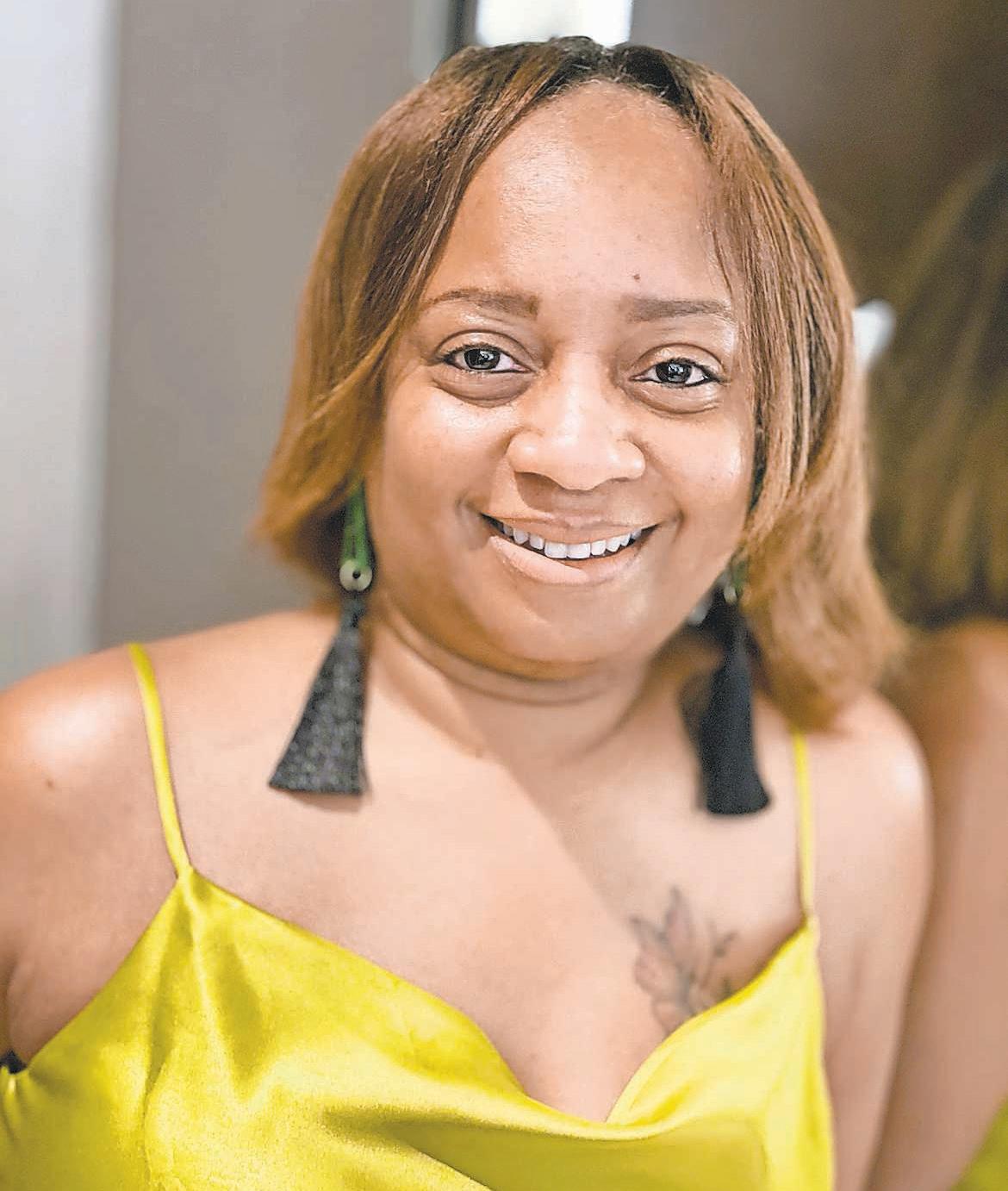



By Tashi McQueen AFRO Staff Writer tmcqueen@afro.com
The number of Black business owners in the U.S. has been steadily increasing year over year, according to recent studies. In 2022, there were approximately 194,585 businesses in the U.S. with majority Black ownership—a significant rise from 124,004 in 2017, according to Pew Research and data from the Annual Business Survey conducted by the U.S. Census Bureau and the National Science Foundation.
This National Black Business Month, entrepreneurs like Anissa Truitt, Christina Sledge and Ceal “Coach KB” Starks are part of that growth, transforming passion projects into profitable ventures. Take a look below at how their journeys are redefining what Black excellence looks like in the world of business and how they are inspiring a new generation of leaders to dream bigger.
Anissa Truitt
Anissa “Donny” Truitt is founder of 17th and Granville, a small, Black and queer-owned clothing brand based in Maryland.
“I was tired of not seeing clothes that felt like me…not just in terms of design, but what they represented,” said Truitt. “I wanted something that spoke to identity, safety and being able to show up in the world without apology.”
Truitt shared that the journey to making this dream a reality has been anything but easy.
“I don’t have outside funding or investors backing me—it’s just me making it work with what I’ve got,” said Truitt. “I work full-time in tech and put whatever I can into this brand. A lot of my sales come from pop-ups, which means I need to have inventory on hand, and that’s tough when every dollar counts.”
Sometimes Truitt said she is left to make the hard choices between acquiring new stock or handling vendor fees.
“I’ve had to really push to stay visible, especially without a big budget or public relations,” said Truitt. 17th and Granville offers gender-neutral, size-inclusive clothing and accessories—including hoodies, overalls and pride-inspired pieces—that celebrate Black and LGBTQ+ identity.
“Everything I put out means

something—to me and to the folks who stop by my table, try something on, and feel like they finally see themselves in a brand,” said Truitt.
“That’s what keeps me going.”
Christina Sledge
Christina Sledge is CEO and co-founder of Sledge House Media, a multi-platform media company that she created with her husband Edward. The company, based in Howard County, Md., was established in 2021.
“Edward and I launched our company with one goal in mind: telling stories that matter,” said Sledge. “As a Black woman, wife and mother, storytelling isn’t just what I do, it’s who I am. What started as a personal mission has grown into a business that publishes books, produces films and helps others share their truths through powerful, purpose-driven content.”
From children’s books to documentaries, Sledge House Media is dedicated to uplifting voices that often go unheard.
Though successful and enjoyable, Sledge noted that the journey has not been easy.

“Navigating the media and tech space as a Black business owner has meant pushing past barriers, funding challenges, gatekeeping and constantly having to prove our value,” she said. “Still, we stayed rooted in the ‘why.’”
Ceal “Coach KB” Starks
Ceal “Coach KB” Starks is the founder and CEO of Ready to Live Soap Therapy, an Atlanta-based company dedicated to transforming mental health care for diverse communities. It was launched in 2022.
“I didn’t set out to start a business,” said Starks. “I was just trying to survive.”
Starks said that after she lost both of her jobs and struggled with unemployment for nine months, she hit a breaking point that led to depression.
“One day, I was sitting at my computer, crying while trying to apply for another job on LinkedIn, when my husband walked in,” said Starks.
She said her husband encouraged her to go play with the soap-making equipment she had. She reluctantly listened, but what she discovered was that her hobby made her feel better.
She then decided to research and found that what she did in her spare time could be considered art therapy. Starks found that though soap making wasn’t a popular form of therapy, she could work to change that.
“That moment of pain gave birth to Ready to Live Soap Therapy, a creative wellness company, where we offer hands-on, sensory-driven soap therapy experiences that help people unplug, heal and reconnect with themselves,” she said. “Our guests walk away with more than a bar of soap, they leave with clarity, peace and the feeling that they matter. We use scent, color and hands-on soap making as a tool for emotional healing.”
Starks shared that in their first year, they reached six figures with a 48 percent in profit margin, grew 13 percent monthover-month and delivered soap therapy to more than 100 commu
nity organizations, schools and non-profits.
“We serve stressed moms, overworked employees, veterans, teens, adults with autism, people in underserved communities, and anyone carrying the weight of life but not sure how to let go,” said Starks. “We help people
didn’t

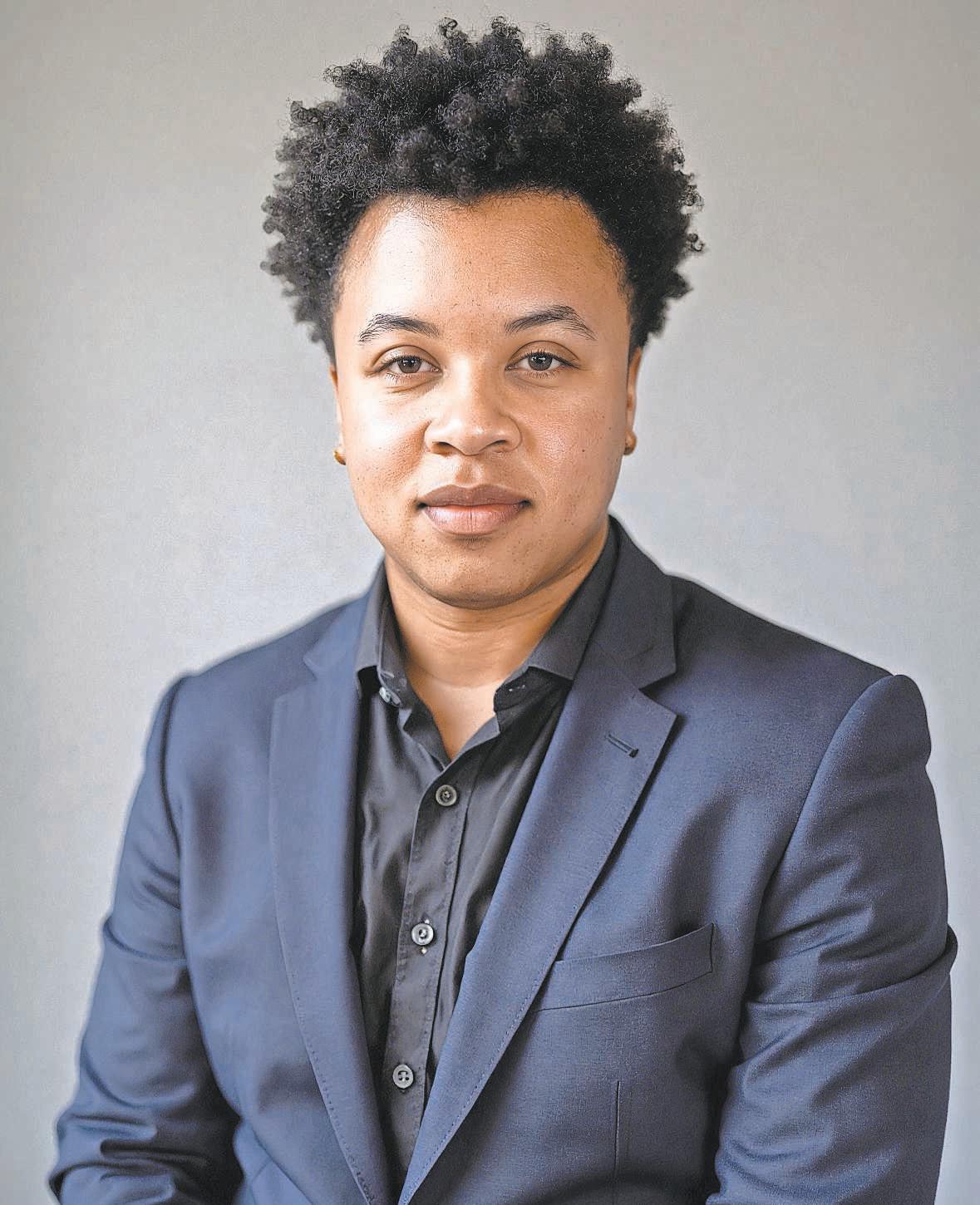
needed

By Victoria Mejicanos
AFRO Intern
From selling food out of her family’s front yard to winning a contest selling AFRO newspapers, Jody Davis grew up with an entrepreneurial spirit. Eventually, she combined that with her passion for fashion and opened her own boutique, Jody Davis Designs.
A proud Baltimore native, she has most recently collaborated with the Baltimore Orioles to repurpose their iconic Birdland Hawaiian Shirt pattern. The new design has raised over $1,000 for the Baltimore Design School, according to Tessa Sayer, a spokesperson for the team.
hobby was actually my gift. I decided I wanted to go to school and study to get that degree.”
Davis applied to the Fashion Institute of Technology in New York and was initially rejected because although she had been designing garments for years, she needed to improve her sketching. At the advice of the counselor who rejected her, she took draping and art classes both in Baltimore and New York. When she went back to the second interview a year later, she got the same counselor and was accepted.
“It’s a testament of what you can do if you’re determined to do so,” said Davis.
“Start right where you are, because if you wait till you have everything in line you would never start.”
Though her name is popular in the fashion world now, for Davis, the road to building a brand has not always been easy.
“I’ve built my brand from the ground up–blood, sweat and tears,” said Davis. “It took me seven years to realize that what I looked at as a

Virginia and across the nation. According to her website, “her clientele includes business owners, professional women, celebrities and media personalities who lead active lives as mothers, wives, elected officials, business and community leaders.”
Davis says her bright and functional designs come from God.
Even after graduating from the fashion institute, and wearing only clothes that she made, she still needed a push to start her own business. She has had her boutique in Baltimore for 15 years and has since gained thousands of loyal clients in Washington, D.C., Maryland,
“I get inspired by fabrics,” the designer said. “If I buy a new pair of shoes that I love, I design a piece that goes well with the shoe. And I always start with me in mind. I design my collection with me in mind, and then it spills over to production and my client.”
Davis said her recent collaboration with the Orioles
came from perfecting her craft. She said she initially thought it was a “prank” and a partnership she had never thought of as a possibility.
“They appreciate the quality of my work and recognize
that I’ve done lots of things in the community,” said Davis. “They were looking to collaborate with someone local, and the rest is history.”
This National Black Business Month, when it comes to
anyone who wants to start a business or an identified passion, Davis’ advice is simple: “Start right where you are, because if you wait till you have everything in line you would never start.”

By Mekhi Abbott Special to the AFRO mabbott@afro.com
Nate Couser, founder of The Artist Exchange and VashtiBlue Jewelry Studio, honors hisheritage and Black history through his art and self-expression. Now, through both his teaching and his business, he is on a mission to ensure that Black art is properly taught, properly represented and gets the recognition that it deserves.
Couser translates his experiences and those of the broader Black community through his jewelry, clothing and art. As a teacher, he integrates lessons on Black art history and the influence of the Black experience on art throughout the years.
Couser’s career as an artist began as a source of creative inspiration and expression.
“In college, I would make my own clothes and jewelry and people wanted to buy it. I realized I couldn’t just keep giving it away. People were willing to buy what I was creating,” said Couser. “Prior to going to college, I went to predominantly White schools and learned mostly White art history. I had to go through a journey of learning more about myself, and that’s when I started calling myself a Black artist.”
Couser majored in urban arts and production at Coppin State University, a historically Black institution in Baltimore. At Coppin, Couser began to make pieces honoring his university and paraphernalia for members of the Black Greek fraternities and sororities. Couser credits his professor Amini J. Courts for connecting him with his history, which he didn’t learn at the predominantly White schools where he studied art.

“There will never be enough art, enough movies, enough books or television shows to cover every single Black story,” said Couser.
“People never tell other cultures to stop telling stories about their history. Some people are ashamed of their
history and unfortunately I believe that it has contributed to the suppression of our voices. Black art needs to be preserved.”
Couser said that being an artist is synonymous with being an entrepreneur, but he considers his art to be
“Art is life. I do art for mental stimulation and it turned into a business. I create art for myself and it just naturally grew into a business.”

less of a commercialized entity and something that is more “spiritual.”
“Art is life. I do art for mental stimulation and it turned into a business. I create art for myself and it just naturally grew into a business. My biggest struggle is actually that I am not a money driven person,” said Couser. “My focus is always just getting the art out.”
Jaye Nicole, an avid supporter and customer of Couser’s, spoke highly about VashtiBlue.
“If you’re looking for jewelry that speaks before you even say a word, look no further than VashtiBlue Jewelry by Nate Couser. Every piece I’ve received has been nothing short of unique, creative and deeply inspiring. It’s like wearable art that carries a story,” said Nicole. “Nate has a rare talent for capturing individuality in his designs, and every time I wear
one of his creations, I stand out without even trying.”
Nicole also complimented Couser’s customer service. She described Couser as very professional, personable and said that he “communicates every step of the way – from custom designs to shipping updates.”
When asked how he sees both his art and business growing in the future, Couser told the AFRO that he is looking forward to doing more collaboration. Meanwhile, loyal customers continue to sing his praises and boost his business.
“If you’re ready to elevate your accessory game and invest in something that feels personal and powerful, I highly recommend VashtiBlue Jewelry,” Nicole added. “Nate
is officially my go-to designer for oneof-a-kind pieces. Trust me, you
find anything else like it.

By Tashi McQueen AFRO Staff Writer tmcqueen@afro.com
With 3.12 million Blackowned businesses in the U.S. and over 800,000 minority-owned businesses across Europe, recent data shows Black entrepreneurship is not only rising—but becoming a powerful global force. This August, National Black Business Month offers a moment to recognize those driving change and those working to leave a lasting footprint for the Black diaspora around the world.
Black entrepreneurs like John E. Harmon Sr. and Stefanie Magness are making it big in business, achieving
opportunities. He is also a nationally respected voice for economic inclusion and Black entrepreneurship.
“AACCNJ serves as the vanguard for 1.2 million Black residents and 124,000 businesses, addressing economic and other disparities,” said Harmon. “We foster relationships within the public and private sectors, working strategically to mitigate underperformance and enhance New Jersey’s competitiveness.”
Harmon has spearheaded advocacy and economic empowerment initiatives for over 1.1 million African-American New Jersey residents and more than 70,000 Blackowned businesses since 2007.
constructing environmental intelligence and assembling a competent team committed to executing with excellence,” said Harmon. “It’s always about the mission and its beneficiaries.”
Harmon’s work has made a powerful national impact, advancing Black business ownership and promoting supplier diversity across industries.
Stefanie Magness
Stefanie Magness is founder and lead strategist of Elevate Visibility Group, a public relations and digital strategy firm.
Magness said through her firm she has been able to help Black women in law, mental health, education and non-
“My journey taught me the importance of devising a plan aligned with ambitions, constructing environmental intelligence and assembling a competent team committed to executing with excellence.”
national and international success. Take a look below at how their journeys are redefining what Black excellence looks like in the world of business and how they are inspiring a new generation of leaders to dream bigger.
John E. Harmon Sr. Harmon is founder, president and CEO of the African American Chamber of Commerce of New Jersey (AACCNJ), a non-profit that aims to economically empower and sustain African American communities via entrepreneurship and capitalistic
A seasoned entrepreneur, Harmon founded Harmon Transfer Corp., a transportation company that served the Northeast U.S. and Canada, in 1989.
Previously he has served as chairman of the National Black Chamber of Commerce. He currently sits on several boards, including the U.S. Chamber of Commerce Board of Directors, Investors Bank, Hackensack Meridian Health and the New Jersey Chamber of Commerce.
“My journey taught me the importance of devising a plan aligned with ambitions,
profit leadership get the kind of recognition and respect that produces change.
“This work is personal to me,” said Magness. “I know what it means to serve from the background, to help others shine and to do it without fanfare.”
Over time, that work has led to national recognition— both for her clients and for her agency.
“What I’m most proud of is helping Black women get seen—not just for what they do, but for who they are and the impact they make,” said Magness.
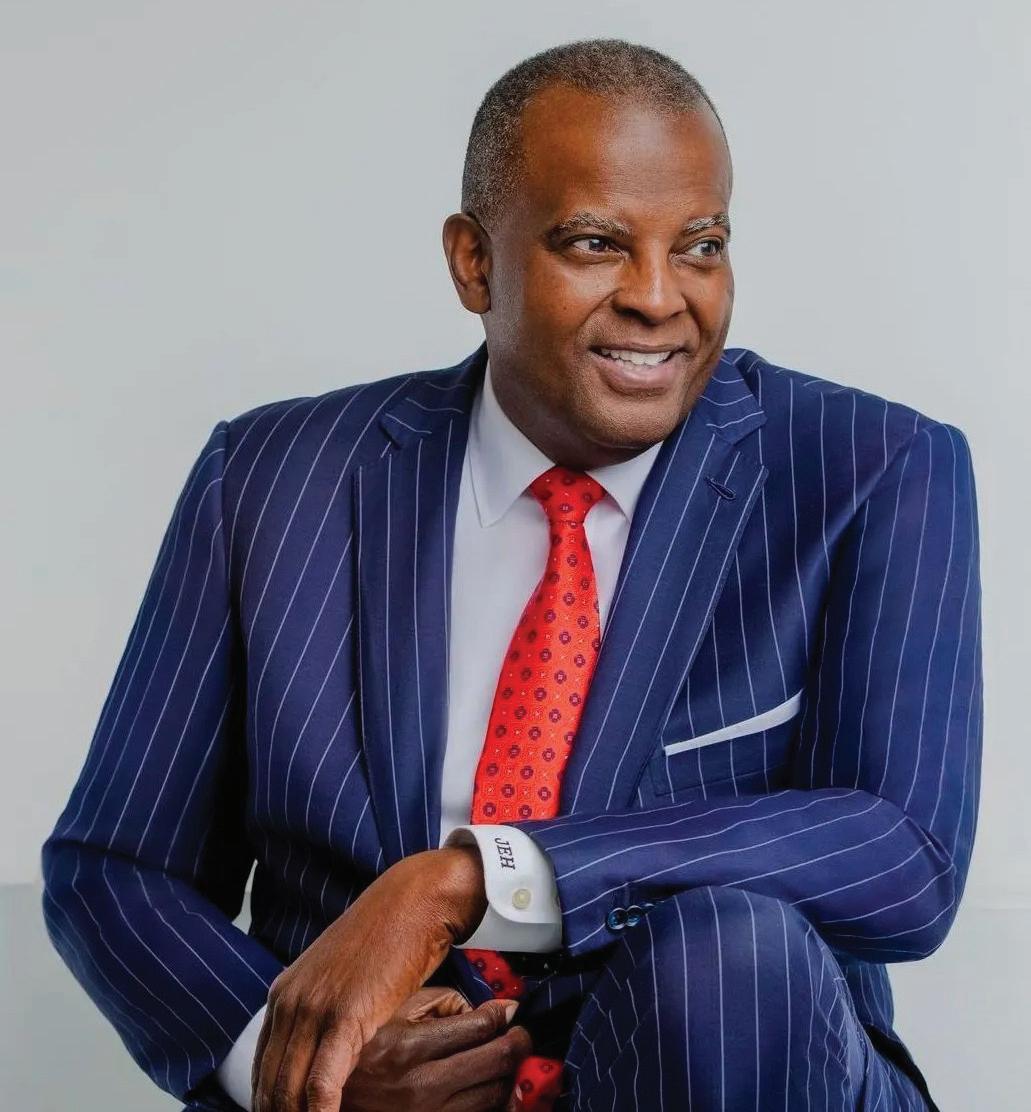
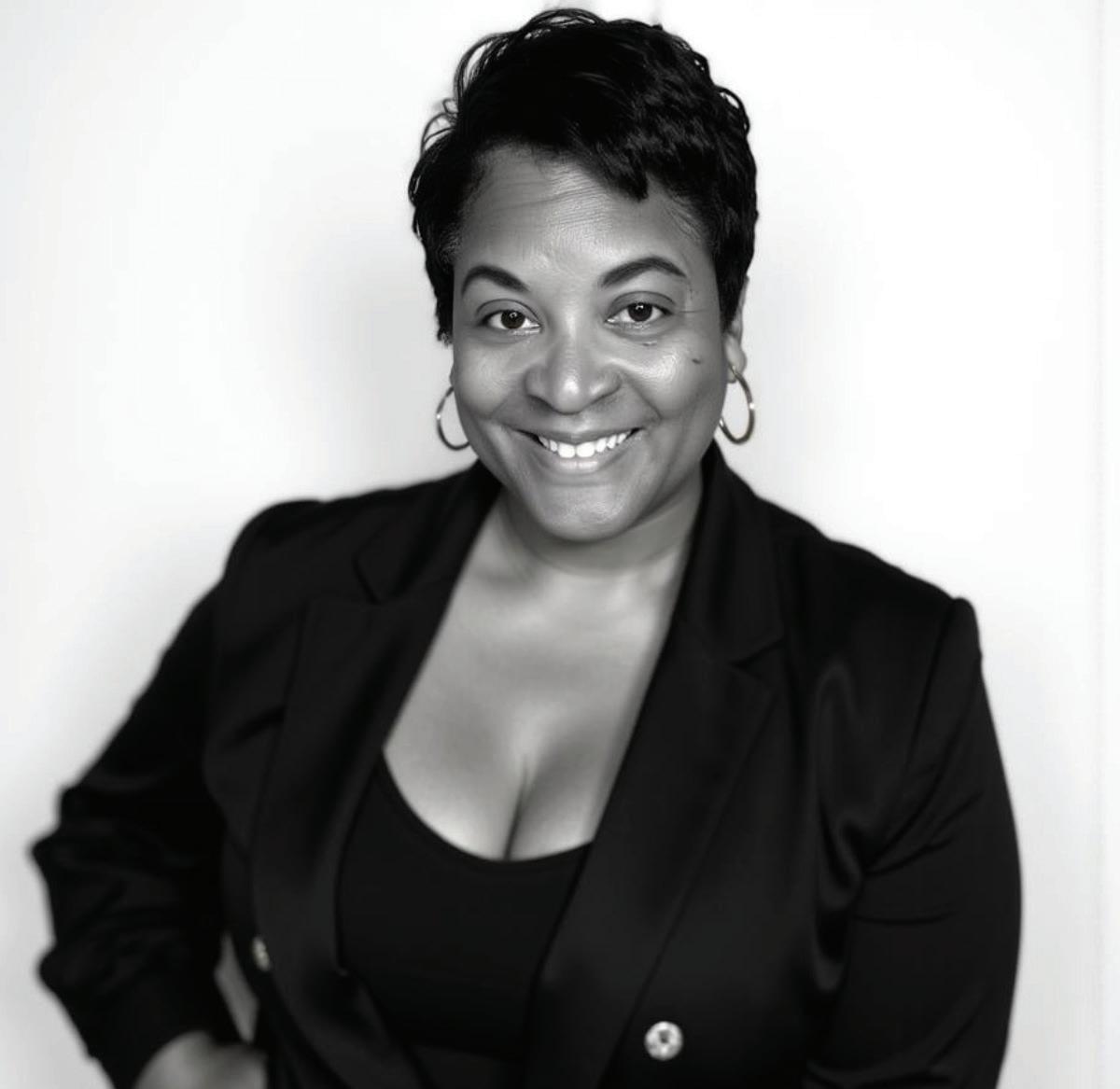
In this year alone, Magness has been recognized as a three-time Qwoted 100 public relations professional and a Clutch finalist for Best Digital Marketing Agency. Elevate Visibility Group was nominated in five categories for The Daily Record’s 2025 Reader Rankings, including Best PR Agency, Best Consulting Firm, Best Digital Marketing Firm, Best Full-Service Marketing Agency and Best Maryland-Based Business.
The Elevate Visibility Group has helped secure significant media features for their clients on CNN, Forbes, The Wall Street Journal, HGTV, The Washington Post and more. “I believe visibility is more than public relations,” said Magness. “It’s a form of power. When we are visible, we expand what’s possible. Not just for ourselves, but for the women watching quietly, looking for someone who looks like them to take up space without apology.”



By Elijah Qualls AFRO Intern
Kelli Redmond’s wellness business, Mova Nature, emerged during the coronavirus pandemic in 2020 and has only grown since. Not only does Redmond sell healthy blends and beverages, she also provides insightful guidance on how to improve lives by promoting healthy diets. With chronic and acute illnesses plaguing African Americans, Redmond is now fighting to enlighten the community one blend at a time.
“People may not always be able to purchase the product, but information stays with you,” Redmond said in an interview with the AFRO. “As long as you have that information to resort back to, you can begin to make your own decisions about the pattern that you want to shift in your life. Wellness is here to empower you.”
Mova Nature has been in the Baltimore area for the past five years. In that time, Redmond’s business has appeared at the Artscape festival, the State of the People National Assembly and at the Middle Branch Fitness and Wellness Center.
“What we’re seeing in Baltimore is a renaissance,” Redmond said. “We’re getting newer markets [in] neighborhoods that were food deserts for decades. We’re getting fresh fruit stands. We’re getting events and the festivals that are free where
people can come get healthy options. It’s important to recognize that there is growth happening within Baltimore City, and there’s still a lot more work to do.”
Dr. Vonnya Pettigrew is the founder and CEO of Branch Media Group and is a collaborative partner with Mova Nature. Pettigrew was influential in facilitating Redmond’s presence at the State of the People National Assembly, a gathering of grassroots activists and changemakers from across the country that culminated in Baltimore in June.
Pettigrew explained to the AFRO why Mova Nature’s attendance was so powerful: “When we’re talking about Black liberation, controlling our narrative and controlling the way we care and love ourselves, nutrition is at the core of that. For Mova Nature’s brand to be a part of that movement, it meant something that was valuable.”
Redmond’s work ethic, tenacity and personability have played a major role in encouraging people to support her mission.
The AFRO spoke with one of Mova Nature’s customers, James Tyner. Having patronized the company for roughly a year, Tyner was able to detail how their efforts have impacted his family and the broader Black community.

“When we’re talking about Black liberation, controlling our narrative and controlling the way we care and love ourselves, nutrition is at the core of that.”
“Most of the time, unfortunately, in the inner city and Black communities where there’s a food desert there’s also lack of education about health in the schools and the resources are scarce,” Tyner said. “What they (Mova Nature) are able to do is go into these communities and provide nutrition that’s not available. Not only are they providing nutrition that’s not available to the community, they’re also educating.”
The efforts from Mova Nature have been intentionally applied by Redmond, who works diligently to change the health statistics seen in the Black community.
“African Americans are leading the rates in chronic illnesses, especially in Baltimore. We’re looking at high blood pressures, diabetes, increased colon cancer diagnoses and that is a result of being in the demographic that we are in,” said Redmond. “There is space– not just in Baltimore City, but in a lot of different predominantly Black areas–where we can do a lot better with access to fresh foods.”


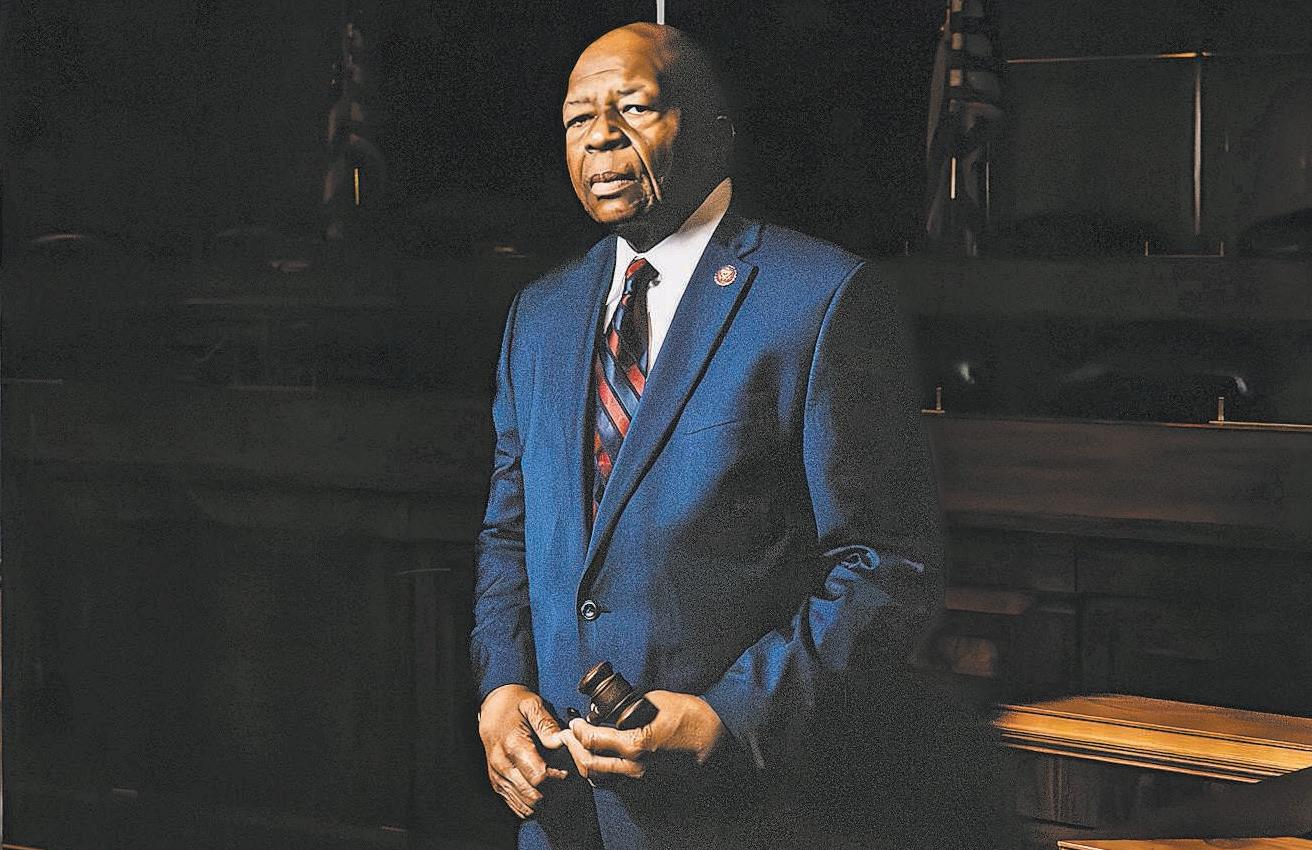
By Tashi McQueen AFRO Staff Writer
tmcqueen@afro.com
U.S. Rep. Kweisi Mfume (D-Md.07) held a dedication ceremony in West Baltimore to celebrate the renaming of a local post office in honor of the late Congressman Elijah E. Cummings on July 25.
“I was privileged to serve with Elijah in the Maryland General Assembly and in the U.S. Congress,” said Mfume at Green Street Academy’s Elijah E. Cummings Innovation Center, a location that provides opportunities for


By
After Venus Williams’ fourmatches-in-four-days return to professional tennis was over, after she was loudly feted by appreciative fans even after a loss in singles, the D.C. Open stadium announcer offered a thought: “We’re never going to say goodbye to Venus Williams, are we?”
Not yet, anyway.
This was not a one-stop hello-and-farewell appearance for the 45-year-old Williams, who had been away from the tour for 16 months before showing up in Washington the week of July 21 and winning once each in singles and doubles. She hadn’t won a
match since 2023, and the owner of seven Grand Slam singles titles, plus 14 in women’s doubles with her sister Serena and another two in mixed doubles, was celebrated by the spectators and other players.
“I’m sorry to have (fallen) short,” Williams said after being eliminated by 24th-ranked Magdalena Frech 6-2, 6-2 on July 24, “but I know I can play better. And I know I will play better.”
Yes, there will be more: Williams next heads to the Cincinnati Open in August… Williams will compete in
By Ariama C. Long
The Sierra Club, in a move reflecting tension at the influential grassroots environmental organization, has sidelined its executive director, Benjamin Jealous, as controversy has ensued over his tenure there.
However, several defenders say that he is the victim of unfair treatment, untenable expectations and racial discrimination as he has tried to steer the group out of a scandal involving its previous leader.
“We have worked with Ben closely throughout his tenure as executive director, and speak from experience.
Ben is under attack by many who, through a pattern of misinformation, character assassination, and discrimination, seek to oust him from his position and drive him out of the Sierra Club,” said Aaron Mair, former president of the Sierra Club’s board of directors, and Chad Hanson, former longtime national Sierra Club board member and a research ecologist with the John Muir Project, in a letter to the organization. “We urge Sierra Club leaders to raise their voices and speak out against this smear campaign.”
Jealous, 52, served as the former president and chief executive officer of the NAACP for five years before stepping down in 2013. He made a run for governor of Maryland

in 2018, and was named the executive director of the Sierra Club in December 2022 after an investigation a year before that revealed a toxic work culture and an alleged rape incident at the organization. He is the first Black person to hold the position.
Last week, the organization told reporters of the change in Jealous’ status with them.
“While we do not comment on any employee’s leave, we strongly reject any suggestion, implication, or claim that Ben’s leave is the result of any discriminatory action by the Sierra Club or the result
By Michael Marot
Bubba Wallace climbed out of the No. 23 car on July 27, pumped his fists, found his family and savored every precious moment of a historic Brickyard 400 victory. He deserved every minute of it.
The 31-year-old Wallace overcame a tenuous 18-minute rain delay, two tantalizing overtimes, fears about running out of fuel late and the hardcharging defending race champ, Kyle Larson, on back-to-back restarts to become the first Black driver to win a major race on Indianapolis Motor Speedway’s 2.5-mile oval. No Black driver has won the Indianapolis 500, and Formula 1 raced on the track’s road course.
“This one’s really cool,” Wallace said.
“Coming off Turn 4, I knew I was going to get there — unless we ran out of gas. I was surprised I wasn’t crying like a little baby.”
His third career NASCAR Cup victory delivered Wallace’s first victory in the series’ four crown jewel events, the others being the Daytona 500, Coca-Cola 600 and Southern 500. It also snapped a 100-race winless streak that dated to 2022 at Kansas and locked up a playoff spot. His only other win came at Talladega in 2021.
The final gap was 0.222 seconds, but that was no measure of the consternation he faced. Larson cut a 5.057-second deficit with 14 laps to go to about three seconds with six laps left as the yellow flag came out for the rain. The cars then rolled to a stop on pit lane with four laps remaining, forcing Wallace to

think and rethink his restart strategy.
“The whole time I’m thinking are we going? Are we not?” he said. “I will say I leaned more towards ‘I know we’re going to go back racing. Be ready. Don’t
“Coming off Turn 4, I knew I was going to get there — unless we ran out of gas. I was surprised I wasn’t crying like a little baby.”
get complacent here.” Wallace made sure of it. He beat Larson through the second turn on the first restart only to have a crash behind him force a second overtime, forcing his crew to recalculate whether they had enough fuel to finish the race or whether he needed to surrender the lead and refuel.
In Wallace’s mind, there was no choice.
“The first thing that went

Towering over the attendees, the
performers do much more than just
By Elijah Qualls
AFRO Intern
The UniverSoul Circus has been known for 31 years for fast-paced, breathtaking and diverse performances.
During their time at the National Harbor – which lasts until Aug. 10 – the AFRO had an opportunity to experience the excitement first hand before the event moves to Baltimore on Aug. 14. The two-and-a-half-hourlong performance offers

Co-Ringmaster Zeke interacts with the audience and brings members on stage for dance competitions and other fun opportunities.

Darryl Barnes (left), the new chairman of the Prince George’s County Planning Board of the Maryland-National Capital Park and Planning Commission (M-NCPPC), is joined by Prince George’s County Executive Aisha N. Braveboy for Community FUN Day “Holidays in July.” The family-friendly event was held on July 19, at the Southern Regional Technology and Recreation Complex in Fort Washington, Md.
By D. Kevin McNeir Special
It’s rare to find one man whose professional career spans leadership positions as a politician, entrepreneur, sports agent and veteran of both the U.S. Army and Navy. But that’s the impressive background of Darryl Barnes who was sworn in on July 8 as the new chairman of the five-member Prince George’s County Planning Board of The Maryland-National Capital Park and Planning Commission (M-NCPPC). Barnes, who formerly served
now Republicans are trying to undermine
By Martin Austermuhle
It’s a mere six lines of text quietly dropped into a 204page congressional spending bill, but that could be enough to upend a five-year-old legal battle between Washington, D.C., and four of the world’s biggest oil companies.
On the night of July 20, the House Appropriations Committee released a draft text of the spending bill that includes federal expenditures in D.C. As usual, the bill also included a number of policy riders, which dictate specific local policies (usually prohibiting liberal priorities).
If passed as is, the riders would repeal D.C.’s medically assisted suicide law, prohibit the city from using its traffic cameras, forbid city funds from being used to subsidize abortions, stop D.C. from legalizing the sale of recreational cannabis, and end non-citizen voting in local elections, among other targets. Some are longstanding attacks on local autonomy (this is why the city’s marijuana situation remains muddled despite being one of the first jurisdictions in the country to legalize it), while others have been proposed before but never made it into law.
But tacked onto that list was a brand new and oddly specific rider prohibiting D.C. from using its marquee
consumer protection law in environmental claims against oil and gas companies. That law prohibits any type of business from engaging in unfair pricing, unconscionable business conduct or deceptive advertising in D.C.
It was that final provision that spurred a 2020 lawsuit from the D.C. attorney general accusing ExxonMobil, Chevron, Shell and BP of “systematically and intentionally misleading District consumers about the role their products play in causing climate change.” (A similar lawsuit was filed by an environmental group against Washington Gas in 2022, but dismissed on procedural grounds.)
The four companies have been aggressively fighting the lawsuit since then, but were handed a defeat when a D.C. judge rejected their request to dismiss the suit on constitutional grounds earlier this year.
The effort to head off litigation over the impacts of climate change certainly isn’t limited to D.C. – at least 10 states have filed their own related suits. In March, The Wall Street Journal reported that executives from a number of oil companies were urging President Donald Trump and congressional Republicans to take steps to insulate them from such lawsuits. And in June, 16 Republican
By Lauren Burke and Jason Roberts
The Washington Post, which has long defined itself as the “paper of record” alongside its biggest rival, The New York Times, is now witnessing a major exodus of Black journalists. Though the U.S. is becoming more diverse, the Post isn’t.
The Post’s headquarters sits in the middle of the District of Columbia, which has a 43 percent Black population and a historic Black university less than 2 miles away. Yet, The Post has never had a history of staff diversity. The recent departure of Black journalists is seemingly related to an anti-diversity backlash led by President Trump after the 2020 George Floyd “racial reckoning.”
Trump’s executive order, signed less than 48 hours into his second term on Jan. 21, declared a policy war on the diversity and inclusivity of historically marginalized groups. Trump’s George Floyd backlash, alongside separate claims of defamation by the president, has led to his targeting of law firms, media organizations and academic institutions. Several media companies, such as ABC and CBS, have capitulated to Trump. The Washington Post appears to be doing so in advance, as Post owner Jeff Bezos has business before the federal government related
to his ownership of Blue Origin and Amazon. The current moment now witnesses an exodus of Black journalists not seen in the paper’s history. In recent years, journalists Vanessa Williams, Wesley Lowery, and Kevin Merida have departed The Washington Post. But the current departures include journalists with decades of experience and several Pulitzer Prizes. The current exodus is noteworthy even by The Post’s low standards for diversity. The Post went for close to a year without a single Black member on the Editorial Board. Currently, the only Black member, the obscure Keith Richburg, is in Hong Kong.
The National Association of Black Journalists noted the issue in a July 26 press release.
The NABJ is “closely monitoring the recent wave of departures and voluntary exits from several legacy media institutions, including The Washington Post. This ongoing disruption has far-reaching implications for newsroom diversity, representation, and the future of Black journalists,” the organization stated.
The list of departures includes two Pulitzer Prize winners: Jonathan Capehart, an opinion columnist

nonstop entertainment for all ages. The audience was left on the edge of their seats with Black acrobats flipping between swings over 10 feet in the air, roller skaters, gymnasts and stilt dancers. Some attendees were also offered the chance to join the performers on stage for dance competitions and other interactive activities.
“It was like a family reunion. We had a ball,” said Washington, D.C. resident Cassandra Denise on her Instagram account, gallivantdmv. “I sang my heart out, and laughed until all my teeth were literally out there. Watching kids just be kids, adults with that childlike innocence. This may be hands down our best experience of 2025.”
The UniverSoul Circus has historically provided expression for the Black communities. Co-ringmaster Zeke told the AFRO that they have
attorneys general asked U.S. Attorney General Pam Bondi to propose legislation to limit climate-related litigation and create a “liability shield” protecting oil and gas companies.
But targeting D.C. is much easier than any of the states. That’s because Congress has ample power to directly interfere in the city’s local affairs – almost always through policy riders that are added to mustpass spending bills.
“The fossil fuel industry and its allies are trying to kill any and all lawsuits that would hold Big Oil companies accountable for their climate lies and the damage they’ve caused,” says Richard Wiles, president of the Center for Climate Integrity, which tracks such lawsuits. “This assault on D.C.’s ability to enforce its own consumer protection laws is part of their playbook.”
Mark Rodeffer of the D.C.
performed for Rosa Parks, Nelson Mandela, Denzel Washington and many more iconic Black figures.
Zeke welcomed guest Co-Ringmaster Sherrell Duncan, of the “Good Morning Show” on WPGC 95.5, to a show in July. Both agreed that the UniverSoul Circus has made an indelible impact on families for many generations. Over the years, the UniverSoul Circus has cultivated a relationship with the Black community through incredible feats and cultural expression.
“We’ve created all types of music and dances,” Sherrell Duncan said of creatives in the Black community, in an interview with the AFRO. “We are creative geniuses. To display something like this to our children, grandparents and all generations is very important.”
Duncan said it’s important “to keep this type of joy and this type of creativity going in the Black
chapter of the Sierra Club argues that congressional lawmakers “had to be tipped off to this by some lobbyist for fossil fuels.”
We reached out to ExxonMobil, Chevron, Shell and BP for comment but didn’t hear back. The House Appropriations Committee similarly did not respond to our questions about who pushed for the rider to be included in the spending bill, which still requires approval by the full House and Senate. (It’s worth noting that these riders can and do often change before passage.)
This also isn’t the only approach that House Republicans have used to try to upend D.C.’s litigation. Over the last two years, they have similarly included a separate rider targeting the local law that restricts SLAPP lawsuits (such suits are often filed by large companies and seek to censor or intimidate critics).
Soon after D.C. sued five years ago, the four oil companies tried to turn the city’s anti-SLAPP law against it, claiming the lawsuit was nothing more than a means
community, because it brings happiness–especially with the climate of the world right now.”
Not only does the UniverSoul Circus provide an escape from the outside world, but Zeke explained how their work has the potential to inspire young children of color to chase their dreams and do what makes them happy.
“All this started with a dream of Mr. Cedric Walker, and he worked on it and worked on it, and voila, here it is,” he said. “No matter what your dream is, you can accomplish it with hard work and dedication.”
“We are an example of that, and we show people that people of color can do all these different things,” Zeke continued. “For the little girls and the little boys to see an image of them in that ring doing these fantastic feats, it gives them a boost that says, ‘Hey, I could do that also. That’s someone who looks like me.’”
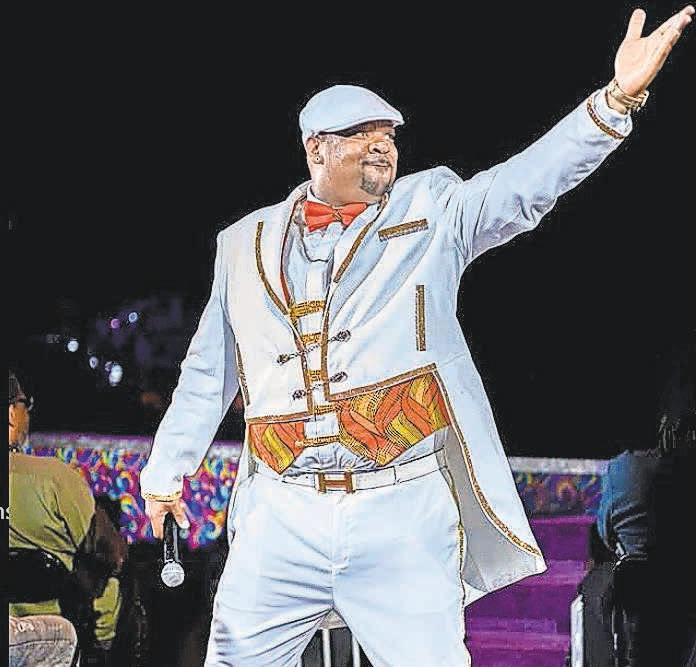
“The fossil fuel industry and its allies are trying to kill any and all lawsuits that would hold Big Oil companies accountable for their climate lies and the damage they’ve caused.”
to silence their free speech. The D.C. Council passed a bill clarifying that the anti-SLAPP law can’t be used against the city, but the rider Republicans have proposed would repeal that. They’ve again tried to include it in this year’s spending bill.
The full slate of D.C.-specific riders proposed by Republicans drew the usual criticism; D.C. Del. Eleanor Holmes Norton called them “appalling” and “unsurprising.” But even some advocates for D.C. autonomy were surprised by how targeted
and specific the new rider is. “Congress is supposed to legislate for the entire nation. You have floods, people losing health insurance… why does Congress have to look at D.C. lawsuits and exempt individual parties?” asked Ankit Jain, one of D.C.’s two shadow senators. “My hope is this is another exercise in futility where they start with all these riders and we can get them out.”
This article was originally published by The 51st News.

as a state delegate in the Maryland General Assembly (2015 – 2023) and previously led the Maryland Legislative Black Caucus as the chairman, was chosen by Prince George’s County Executive Aisha N. Braveboy to take over his new role and has in short order displayed his unique style of leadership.
In a one-on-one interview with the AFRO, he expressed his excitement about being given the opportunity to serve the people of Prince George’s County, where he was born and raised, and shared his vision about making the county “a destination.”
AFRO: It’s been less than a month since you’ve taken on this new position, and it’s said that you’re already off and running. How does it feel to take over a department responsible for providing recreational activities and programs for residents and visitors in an area that encompasses more than 29,000 acres of park land, trails, athletic fields and playgrounds?
DB: I am extremely humbled by this opportunity and excited to have broader conversations on land use planning and zoning, park acquisition and development, recreation programs, stewardship of natural, cultural and historical assets. When you look at the two operating departments for planning and parks and recreation, there is nothing but opportunity
for upward growth.
AFRO: Prince George’s County hosted a Community FUN Day “Holidays in July” celebration on Saturday, July 19 – a family-friendly event held at the Southern Regional Technology and Recreation Complex in Fort Washington, Md., that served as your introduction to the community. What are your thoughts about that festive afternoon?
DB: It was a great coming out party for me and I was especially pleased to have Prince George’s County Executive Aisha Braveboy show up and give her support. But the real stars of the day were the hundreds of children who came out with their families for a day of fun. The smiles on their faces as they ran up to accept free bicycles, dolls and other toys were priceless. Some children even sent me videos to express their thanks which really touched my heart. Others were clearly excited to see rangers from the Park Police Department show up riding their beautiful horses. Because of our many sponsors, we were able to give families bags of groceries filled with frozen foods and meats. And there were tables with information about the services and programs we offer in the over 29,000 acres of park land, trails, athletic fields, and playgrounds that our department oversees.
I was also encouraged because things ran so smoothly. It’s clear that those who represent
Maryland Park and Planning realize my vision and are prepared to execute it. And I’ve only been on board for just under a month.
AFRO: By state law, the commission is responsible for acquiring, developing, maintaining and administering a regional system of parks and to facilitate a general plan for the physical development of both Prince George’s and Montgomery counties. But what’s your vision and do you feel any pressure being only the third African American to serve as the chairman?
DB: To be clear, my vision is to make Prince George’s County a destination. We have some of the most impressive and award-winning recreation centers in the country located right here in our county. We have amazing programs for youth, seniors, and everyone in between. And we have an amazing team of employees, some who have been with Park and Planning for more than 30 years, and who remain committed to providing the best service possible to county residents and visitors. We have an opportunity to rewrite our narrative and to work on some of the internal processes we need to improve what we already do for the betterment of our workers and our customers. I’m here to enhance what’s already in place. And as a destination, I want those who live in Prince George’s County to feel good about where they live – to walk with their heads up and shoulder out.
who has been with The Post since 2007 and is taking a buyout offer. Capehart also recounted a racial episode in 2024 in his book related to his former colleague Karen Tumulty, who was deputy opinions editor at the time. Tumulty has now been promoted to lead the Post’s politics coverage.
Post editorial board member Karen Attiah announced on social media on July 22 that she was “the last Black staff columnist left in the Washington Post’s opinion section.” On July 21, Pulitzer Prize-winning author Toluse Olorunnipa, who was the White House Bureau Chief for The Washington Post, announced he was now a writer at The Atlantic. Olorunnipa won the Pulitzer for the book “His Name is George Floyd” in 2023 for General Nonfiction. Several Post journalists have fled to The Atlantic. Other departures include Eugene Robinson and Krissah Thompson, who was the only Black managing editor on the masthead.
“After 24 years at The Washington Post, I’m turning the page on this chapter of my career. I’m grateful for the wonderful experience that I’ve had and the contributions that I’ve made over 24 years as a reporter, editor, and news leader,” Thompson wrote on her Instagram page on July 23.
Trump’s executive order, which called for the termination of all federal government programs relating to “diversity, equity, inclusion, and accessibility,” appears to have been obeyed even by private sector actors under no obligation to comply. Post CEO Will Lewis has remained in charge despite a 2024 controversy surrounding his connections to a scandal related to the illegal phone-hacking of members of the British royal family. Many recent hires at the Post have been in some way connected to the more conservative The Wall Street Journal. The latest round of buyouts ends on July 31, so many more departure announcements are expected in the coming weeks.
This article was originally published by the NNPA Newswire.
AFRO: What tasks stand at the top of your list of things that you want to accomplish?
DB: The county executive said she wants to transform Prince George’s and as I said earlier, to make it a destination. With Six Flags–500 acres of land– closing at the end of the season, we want to have a seat at the table to determine how to best utilize that property. Should the Commanders leave the county, that will make available another 200 acres of land. Our master plan looks ahead 20 to 30 years. But with things like Six Flags or the Commanders, you must be prepared to “call an audible.” National Harbor, with 180 acres of land, has been transformed and became a flagship location in the county. Imagine what we can do with Six Flags and even more acreage?
AFRO: What’s one thing that people may not know about you?
DB: Sports is something I have enjoyed and whenever I can, I go to football or basketball games. I have season tickets for the Wizards which isn’t unusual for a person like me who was once a sports agent and represented both NBA and WNBA players. But I am a big football fan, too, especially the Washington Commanders. My sister shares similar passions, and after stints at Arizona State, Wake Forest and Georgetown, she’s currently the associate head coach for Syracuse University’s women’s basketball team. So, sports run in our family.
By Tavon N. Thomasson AFRO Intern tthomasson@afro.com
Maryland leaders expressed outrage on July 28 after being denied access to holding areas inside of the U.S. Immigration and Customs Enforcement’s (ICE) Baltimore Field Office. Despite federal law granting the legislators the right to conduct such visits, they were not allowed to view conditions inside of the office, located in the George H. Fallon Federal Building at 31 Hopkins Plaza.
In response to mounting concerns about prolonged detentions and limited
medical and legal access for immigrants, the Maryland lawmakers scheduled a formal oversight visit to the Baltimore Field Office. However, when U.S. Senators Chris Van Hollen (D-MD) and Angela Alsobrooks (D-MD), and U.S. Representatives Kweisi Mfume (D-MD-07), Glenn Ivey (D-MD-04), Johnny Olszewski, Jr. (D-MD-02), and Sarah Elfreth (D-MD-03) arrived, Nikita Baker, acting director of ICE’s Baltimore Field Office, blocked their entry. Baker stated she was just following directions handed down to her.
“Instructions I’ve been
“I’m old enough to remember when Black people were snatched off the streets in this country simply because they were Black—not because they committed a crime or were suspected of anything…”
By Marnita Coleman Special
to the AFRO mcoleman@afro.com
At 85, the Dr. Zollie David Bagby Sr. is officially stepping down from the pulpit. The pastor emeritus of The Village Baptist Church in Baltimore was celebrated at his retirement celebration on July 26 at Doubletree by Hilton Baltimore, Pikesville–North.
Rev. Bagby announced his future retirement back in May 2023, after serving for 35 years as pastor.
“They respect that I’m 83 years old [but] I don’t want the church to go backwards,” he said at the time.
Rev. Bagby feels a younger pastor would have a great impact on this generation. So he’s “getting out of the way” and “going to do a lot of fishing” at his favorite hot spot in Kent Narrows, Md. The “recreational angler” expects to
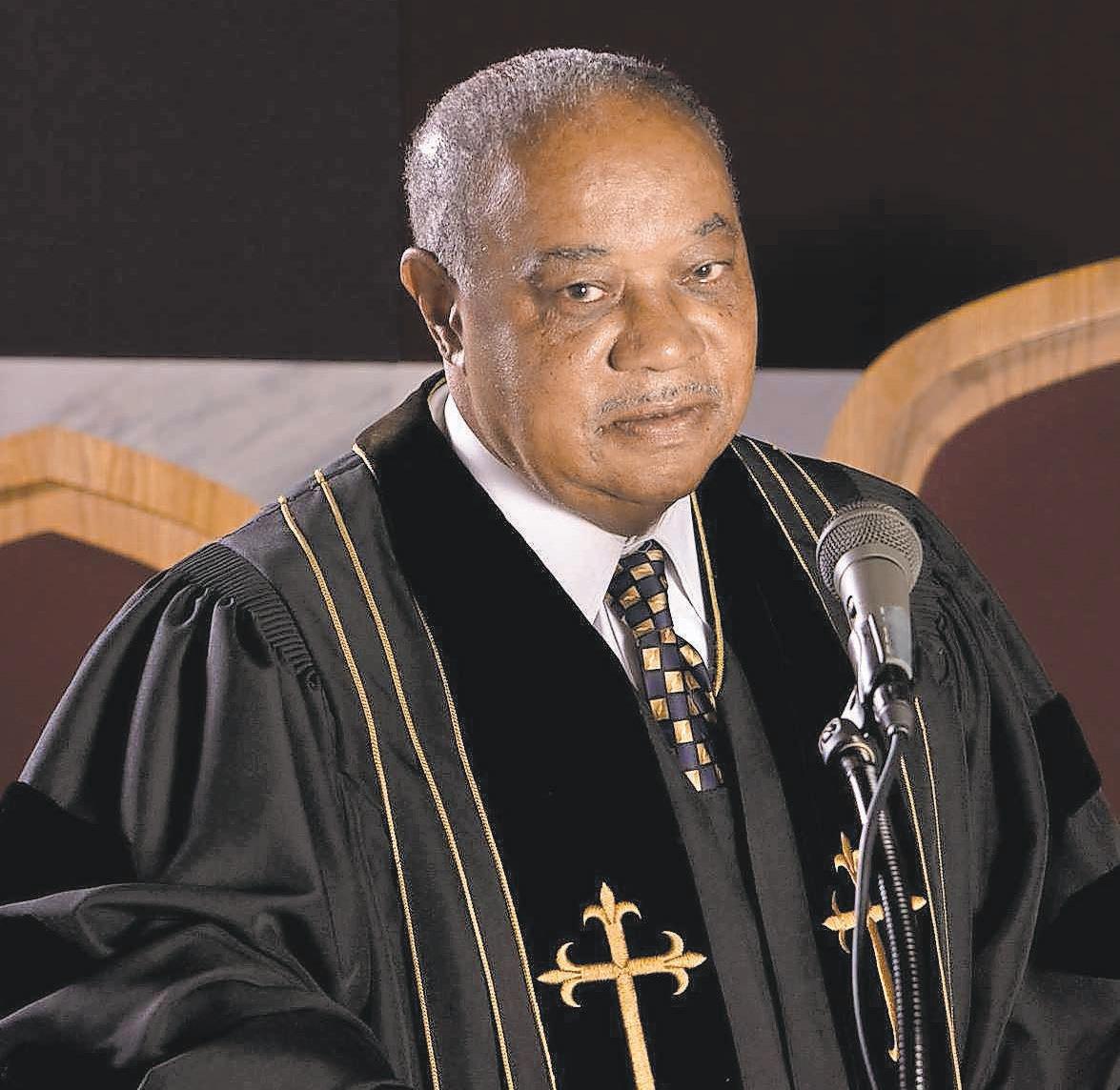

By Tashi McQueen AFRO Staff Writer tmcqueen@afro.com
Months after an internal investigation into its leadership, the NAACP’s Baltimore branch provided an update on its future–while also criticizing the national office’s handling of the case.
given from our headquarters department [state] that at this time, we’re not allowing any visits to our hold room. The oversight that you’re talking about doesn’t fall over hold rooms and things of that nature,” Baker told the group of lawmakers.
The denial sparked a tense back-and-forth between the delegation and the ICE official, during which Rep. Mfume invoked a historical comparison, linking the current treatment of immigrants to the racial targeting of Black Americans in the not-so-distant past.
“I’m old enough to remember when Black people were snatched off the streets in this
country, because they were Black—not because they committed a crime or [were] suspected of anything—and that was not that long ago,” Mfume told Baker. “That’s a perspective that haunts many of us. It certainly haunts me. And I would hope, as a Black woman coming out to tell us what you did without any real explanation, I hope later today, that sort of spirit haunts your soul—and that you realize [this] is more important than a job.”
Despite repeated attempts to get answers from Baker about the office’s operations,
“The Baltimore City unit has been under administrative oversight by the national office for the past eleven months,” said the executive committee of the Baltimore NAACP in a statement released in late July. “During this period, the national office has failed to conduct a credible, comprehensive and conclusive investigation and has repeatedly violated its own constitution and bylaws. At no point has the unit been provided with regular updates regarding the status or progress of the investigation.”
The local branch claimed the inconsistent updates from the national office has significantly impaired their ability to carry out its essential functions and serve its members properly.
The Baltimore NAACP also announced that the national office has taken over all operations of the branch.
“The national office has removed our authority to schedule any executive or membership meetings for the foreseeable future,” said the executive committee of the Baltimore NAACP Branch. “Henceforth any communications with you,
“The Baltimore NAACP affirms that no new official actions have been communicated from the national office.”
the members of the NAACP Baltimore City unit regarding the business of our unit will come from the National Office at their discretion.”
The executive committee encouraged members to speak out against what’s happening to the local branch in Baltimore City.
“Our collective commitment to justice, transparency and community service must not be undermined by continued inaction and disregard for the principles upon which this organization was founded,” said the executive committee of the Baltimore NAACP.
The AFRO reached out several times to the national office for comments on this matter but did not receive a response.
Aside from criticizing the national organization’s handling of the Baltimore City NAACP Chapter, the group also released a statement denying claims from a local news report that the
By Ericka Alston Buck Special
to the AFRO ealstonbuck@afro.com
A vibrant new mobile mural celebrating Black excellence, culture and legacy was unveiled July 27 in West Baltimore. The work of art pulled together families, artists and local leaders in a festive community gathering outside of Jubilee Arts, located on Baltimore’s famed Pennsylvania Avenue. The mural, a collaborative effort by Creative Nomads and
Afro Charities, marks a new chapter in both public art and Black history preservation—and it has found a permanent home on the fence surrounding the future AFRO headquarters at the historic Upton Mansion. Designed through a series of community visioning sessions and painted with the help of local residents, the mural is a vivid tribute to the resilience and richness of West Baltimore. It features historic imagery from the AFRO’s archives—portraits of the paper’s

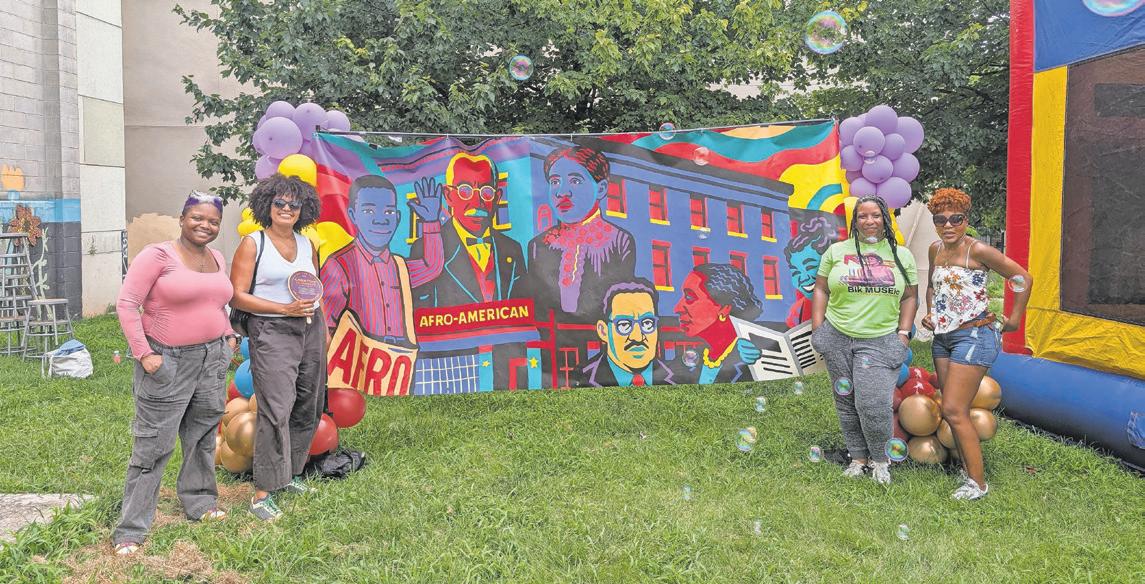
and
Amber Campbell-Wheeler,
and
and partnership.
to save
By D. Kevin McNeir Special to the AFRO kmcneir@afro.com
From conversations at the dinner table to somber thoughts shared before bedtime, the tragic July 20 death of Malcolm-Jamal Warner, who starred on “The Cosby Show,” has African-American families speaking candidly about the disproportionate number of Blacks youth who die each year from drowning. Data released by the University of Maryland, Baltimore, which factors in research
from the Centers for Disease Control and Prevention (CDC) and the World Health Organization, indicates that drowning is the number one cause of death for children aged 1-4 in the United States, and the second leading cause of unintentional injury death for children aged 5-14. But Martin Thorpe II, owner, head coach and director of Baltimore’s oldest Blackowned swimming organization, the 4M Swim Club, said the situation is even more grave for
probe has resulted in yearslong suspensions for its top leaders.
“The Baltimore NAACP affirms that no new official actions have been communicated from the national office,” said the Baltimore NAACP in a statement on July 22. “Members remain in regular communication with Rev. Kobi Little and Joshua Harris, who have not received any
the delegation ultimately exited the building and addressed the press after concluding they would not be granted access. Outside the federal building, lawmakers condemned the denial as both a violation of federal law and a moral failure.
“We came here today to this ICE facility because it has become a hub of the inhumane Trump policies right here in the state of Maryland,” said Sen. Chris Van Hollen, during the press conference. “President Trump lied to the American people when he [claimed] the Trump administration was simply going to focus on ‘the worst of the worst.’”
Van Hollen’s reference to “the worst of the worst” highlights the Trump administration’s
investigative findings to support the allegations made against them, nor has our branch been provided with any formal notice of investigative procedures or due process.”
The branch goes on to claim that the accusations made against Little and Harris are “baseless and unsubstantiated.”
“We look forward to them clearing their names and resuming the vital work they’ve long led with integrity,” said the Baltimore NAACP.
In addition, the branch also called for the immediate suspension of former president Marvin
stated goal of targeting immigrants with serious criminal histories or ties to violence. He argued that, in reality, ICE is detaining people who pose no threat at all.
“There’s no disagreement that when you have people breaking the law and committing violent crimes that detention is appropriate and necessary,” said Sen. Van Hollen. “But that’s not what the Trump administration is doing, and that’s not what they’re doing [inside] that ICE office. That’s why they don’t want the American public to know what’s happening. That’s why they shut the door and locked us out.”
As the press conference closed, lawmakers emphasized the broader implications of what had just occurred.
“If this is how they’re treating their elected officials or members of Congress, how are they treating everyday Americans?” said Rep. Elfreth. “I would encourage folks to reach out to our offices if we can be of assistance.”

“Doc” Cheatham for speaking to the media without the NAACP’s authorization.
“Cheatham’s decision to speak to the media—despite explicit instructions from National Board Member and Chapter Administrator Michael Curry that all branch leaders refrain from doing so—represents a clear and direct violation of organizational policy,” said the Baltimore NAACP. “His repeated actions and public statements have caused irreparable harm to the integrity, unity and public perception of the NAACP and undermine the values and mission of this historic civil rights organization.”
Continued from B4
founders, paperboys and iconic scenes from the former headquarters on Eutaw Street—interwoven with bold colors drawn from the AFRO’s own print palette.
“This project is about marrying community and art,” said Kayenecha Daugherty, executive director of Creative Nomads. “It’s about bringing vibrancy to places where there may be blight, and giving everyone access not just to beautiful art, but to the process of art-making itself.”
To deepen the experience, the mural includes an interactive digital element.
“It’s not just a mural you look at—it’s one you can interact with,” said Savannah Wood, executive director of Afro Charities. “The project includes an augmented reality (AR) video component, allowing viewers to unlock layered stories and visuals through their phones.”
The mural’s placement at the Upton Mansion symbolizes the future. The $16 million redevelopment project will transform the building into the new headquarters of the AFRO-American Newspapers and a dedicated research center for its historic archive— the largest and most complete repository of Black journalism in Maryland. Construction is expected to be completed by June 2026.
“This mural reflects everything the AFRO stands for,” said Wood. “It tells the story of our community’s excellence, our history and our connection to place—all using imagery straight from the archive.”
The unveiling celebration had all the makings of a family-friendly summer block party: a bounce house, music, snow cones, burgers and hot dogs—all offered free of charge. “It’s about art, but it’s also
Cheatham, who was a part of the joint complaint that led to the Sept. 16, 2024, immediate suspensions of Rev. Kobi Little and Joshua Harris, pending investigation, responded to the call for his own suspension.
“I’m not afraid because I’m going to tell the truth…they have basically been neglecting us,” Cheatham told the AFRO. “The branch had a fire [about] two years ago, it has not been fixed since then. They did not give minutes to the meetings and they did not give us financial reports. This might be my punishment, but I believe I was right.”
“It’s about art, but it’s also about joy and belonging.”
about joy and belonging,” Daugherty emphasized. “When you bring people together like this, you create not just moments but movement.”
The mural was created by Baltimore-based artist Natasha Frank, who wove together the vision of the community, the legacy of the AFRO and the creative direction of both Creative Nomads and Afro Charities.
“We want to thank Natasha for bringing these stories to life with such care,” said Daugherty. “And we’re deeply grateful to the Mayor’s Office of Recovery Programs and United Way for their support in making this project possible.”
As redevelopment of the Upton Mansion continues, the mural will remain a public-facing symbol of transformation—literally surrounding the site with color, history and hope. And when construction wraps, the original artwork will move into the AFRO Archives for future generations to study and celebrate.
For more information on upcoming events and projects, follow @CreativeNomads and @AfroCharities on Instagram. Creative Nomads is currently preparing for the Collective Giving Day on Aug. 8 and will host its annual fundraiser, Jubilee Noire, on Sept. 27 at Clifton Mansion. Afro Charities will also continue its biannual artist commissioning program inspired by the AFRO Archives, with more community programs scheduled for this fall.
“There’s a lot of good happening in Baltimore,” Daugherty said. “It’s time we amplify it.”
catch croaker, trout and spot fish with his faithful Ugly Stik fishing rods.
The Rev. Dr. Minnie R. Washington, pastor of St. Timothy’s Christian Baptist Church of Baltimore, offered Bagby her regards, praying that “his life will be long and fruitful” as he enjoys retirement.
Rev. Bagby graduated from the Virginia Theological Seminary and College in Lynchburg, Va., with a bachelor’s degree in religion and a master’s of divinity degree in theology. The Maryland Theological Seminary of Baltimore conferred upon him a doctor of divinity degree in December 1996, and Eastern Theological Seminary of Lynchburg, Va., awarded him a doctor of humane letters degree in October 2013.
During his distinguished career, Rev. Bagby served and held offices in Christian, community, and fraternal organizations. He also authored a book titled, “Man’s Misconceptions of Biblical Promises,” that addresses specific conditions of promises, repentance and faith.
Rev. Bagby affectionately recalled serving for 13 years as a deacon before he was elevated to associate minister under the pastorate of the late Rev. Preston E. Johnson at Friendship Baptist Church, when it was located in Baltimore’s Edmondson Village.
“We did a lot of ministry in that community,” Rev. Bagby recalled. “We visited the sick, fed the hungry and buried their families.” He lived in the neighborhood and the people knew him well because of his work.
At that time, Rev. Bagby was sensing the Lord’s call to step out into his own ministry. But he stayed with Friendship Baptist Church until it relocated to Loch Raven Boulevard in East Baltimore, under the leadership of the late Rev. Dr. William McCoy Jr.
It was a “drastic” move, Rev. Bagby said, and that’s why Pastor McCoy asked him to delay his startup until after Friendship was settled in its new home.
So, on Nov. 6, 1988, Bagby launched his church with the support of 40 charter members. Prior to establishing its permanent home, the congregation alternated between Allendale Senior Citizens Building on West Franklin Street and Mary E. Rodman Recreation Center on West Mulberry Street for six-and-a-half years.
Finally, they purchased land and built a church at 100 South Hilton St., and in November 1994
“I’m getting out of the way and going to do a lot of fishing.” — Rev. Dr. Zollie D. Bagby Sr.
they moved in. The fellowship grew with 80 percent to 90 percent of the members coming from the immediate vicinity.
Rev. Bagby said he has “appealed to the family” and that’s what the church is made of now.
“The Village Baptist Church became a living body of baptized believers in Jesus Christ whose mission was to glorify God and evangelize the world through worship, discipleship, fellowship, ministry and outreach,” he proudly declared.
As the people’s hero, Rev. Bagby has been recognized for “devoted and invaluable services,” as well as receiving numerous awards, including the Congressional Achievement Award presented by the late Congressman Elijah E. Cummings, a citation from the Maryland Governor’s Office for successful civic and humanitarian leadership, and a proclamation from the City of Baltimore, lauding him as an influential member of the community.
Rev. Washington agreed that Bagby is a “very humble man,” a “gentle giant,” “easy to love” and “well respected.” Rev. Bagby was her late husband, the Rev. Dr. Carl L. Washington Sr.’s “good friend,” she said, and she will “always cherish the relationship” they had.
For 52 years, Bagby was married to the late Carolyn Williams-Bagby, co-laborer in ministry, teacher, deaconess and coordinator of the Culinary Ministry. They have two adult children, Zollie David Bagby Jr., and Rhonda Lee Bagby-Alston. In 2019, six years after the death of his first wife, Rev. Bagby remarried Delores Wilson-Bagby, who died suddenly in 2020.
Born in Oxford, N.C., Rev. Bagby was raised from age 3 by his mother, Sarah Reed Gregory, and stepfather, Golden Gregory, after his father died. Bagby was said to have a “call on his life” as a young boy. His mother named him Zollie, which has Hebrew roots and is a variant of Solomon, meaning “man of peace.”
And that’s who he is, “a humble spirit and servant of God,” said daughter Rhonda Lee Bagby-Alston. “Always sharing the Word, teaching us to pray and live godly lives.”

grave for African-American children.
“When I speak to parents and youth, I point them to the realities: 64 percent of African-American children have little to no swimming ability, compared to 40 percent of White children, according to a 2017 study by the USA Swimming Foundation and the University of Memphis,” Thorpe said. “Just because you’ve learned to swim, doesn’t mean you have acquired the skills to go out and negotiate ocean waters, which are rougher than the water in a pool and have undercurrents that can suddenly pull you underwater.”
“In the U.S., 10 people drown each day, and among children under 15, only car accidents result in more deaths each year than drowning,” said Thorpe. “Drowning is fast, silent and can happen in as little as 20 to 60 seconds. That’s why my father (Marvin Thorpe Sr.) founded the 4M Swim Club in our backyard in 1972, offering learn-toswim programs for African Americans.”
Before the younger Thorpe took over, he and his father taught swimming and water safety for 30 years, side-by side – a relationship which only ended with the death of the senior Thorpe in 2004.
Marvin Sr. says he has taught more than 15,000 students how to swim over his 32-year tenure at the 4M Swim Club. He is also believed to be the person who has taught more Blacks to swim than any other local instructor in Baltimore or even the state of Maryland.
Turner Bryson crew makes swimming a family affair
Sasha Turner Bryson and her husband, Howard Bryson, live in Towson, Md. But as proud natives of Jamaica, she said they’re both very familiar with the ocean. However, after seeing a good friend – a young man and highly skilled swimmer – die after being swept away by strong ocean currents – she became afraid of getting in the water.

“Drowning is fast, silent, and can happen in as little as 20 to 60 seconds.”
alone or don’t swim during a thunderstorm,” she said. “My son reminds us of these and other rules whenever we’re close to water–I like that.
“Some of the parents and grandparents who bring their children for lessons aren’t great swimmers but they want to know how to help themselves or their children if they’re suddenly in the water and in trouble,” the Maryland mother continued. “Those who have had traumatic experiences in the water must work to overcome what occurred in the past so that if they’re ever thrown into a dangerous situation, they won’t be paralyzed with fear. Our family has learned to respect the water but to not fear it.”
Disparity in drowning deaths reflects societal factors
Thorpe agrees with other experts who say Blacks are subject to death by drowning at far greater rates than Whites because of both historical and societal factors. These factors include lack of access to pools and swimming lessons due to segregation and discrimination, lack of resources to afford swimming lessons and pool access, and a potential fear of water and swimming often passed down through generations within families.
“If basketball is your thing, you can grab a ball and go out in the street to play, to have fun and to get better,” Thorpe said. “But finding a pool, and then finding one that’s affordable is a lot harder. You certainly cannot learn how to swim in a bathtub.

“After starting our family, my husband and I realized that if I was going to overcome my fear and prepare our children so they would be safe in the water, we would need to find a good coach or a good school that offered swimming lessons and Both of their children have completed several classes at 4M Swim Club as well as Sasha who has taken two classes alongside her son, Nyo, 4. As for her oldest child, 10-year-old Zaria, she has “Mr. Thorpe and his teachers constantly empha size essential water safety rules, like never swim
“Just look at the Olympics. Most of the swimmers look alike and they don’t look like you or me. Even if there are free or inexpensive programs in one’s community, in most cities they’re only offered during the summer. But there are 12 months in a year. So, how do you practice and remain constantly exposed if you only have three months in the water each year?”
For Cynthia Paxton, whose granddaughter,
affordable and close by,” Paxton said. “But as time went on and I began to recognize how much she loved swimming and how talented she was, I began to search for programs and camps that provided a higher level of instruction and included more time for her to practice in the pool.”
Paxton said she became aware of the 4M Swim Club by chance after hearing about Thorpe’s successful initiatives during a media report.
“We lucked up with Mr. Thorpe’s programs –hearing about them that is – because I was not part of a swimming community,” she said. “Fortunately, the pools he uses weren’t far from our home. So, I dug deeper, and I liked what I found.”
school, Mercy High, which is an all-girls, Catholic school, I’m the only Black on the team and often the only Black at our swim meets,” said Lisandra Paxton, 15. “But I’m confident in my abilities, so that doesn’t bother me.”
Lisandra recently completed a Red Cross certification program and in June, she accepted her first position as a lifeguard.
“Sure, it can be stressful because you have to deal with parents and children who sometimes try to ignore the rules, which I have to enforce to keep those who are in the water or who are around the pool safe,” she said. “But to become certified I had to prove myself, including being able to swim





of urging by outside parties,” said Sierra Club Chief Communications Officer Jonathon Berman in response to a query from the AmNews. “Anyone claiming otherwise does not have the benefit of the facts.”
Mair, a retired New York State public health epidemiological-spatial analyst, said there is an underlying cause behind the rupture between Jealous and the Sierra Club.
“A board member — basically. Ben called him out and said you’re undermining our position, this is problematic, and so he immediately tried to come back, saying Ben was threatening him,” said Mair. “Now, all of a sudden, everyone is scared of the angry Black man, which is bullcrap. It’s one of those things where you know you screwed up.”
Jealous’ leave comes after several rounds of layoffs were announced, raising tension among local chapters, “bad faith” contract negotiations, and complaints from the Progressive Workers Union (PWU), which is an external entity separate from the club. Jealous was also slammed in a staff letter for not articulating a concrete strategy to fight back
against President Donald Trump’s anti-environmental agenda.
The PWU claims that Jealous has eliminated the environmental justice campaigns and equity team, as well as “laid off a disproportionate number of Black, Indigenous, People of Color (BIPOC)” staff. Union members overwhelmingly passed a no-confidence vote on Jealous last year.
A letter from Robert Bullard – considered the father of environmental justice – to the group’s board of directors also expressed concerns about Jealous’ ability to do his job.
Bullard said that Jealous and the Sierra Club had made specific commitments to Black homeowners in the flood-damaged Shiloh community in Coffee County, Ala., that never came to fruition.
“Residents have come to feel a deep sense of betrayal and left hanging when the promise of securing an attorney and commitment to support legal action against the Alabama Department of Transportation never materialized,” Bullard wrote on his website.
“And then weeks of silence ensued and no updates.”
The Sierra Club’s Board of Directors
“Now, all of a sudden, everyone is scared of the angry Black man, which is bullcrap.”
voted in June 2025 to approve a $144 million budget for fiscal year 2025–2026, despite strong opposition from volunteer leaders and the PWU. The budget resolution said there was no net operating deficit. Mair, who was a member of the club’s finance committee, said the layoffs were the consequence of a $40 million budget deficit that preceded Jealous’ tenure. Jealous had to balance the budget by cutting “unnecessary and non-staff costs” and reducing staff, said Mair, and was vilified by the PWU for doing so.
Mair said the Sierra Club has been experiencing a “culture war” along with a budget crisis since 2020’s racial reckoning and the death of George Floyd. The club’s staunch “nature conservationists” are clashing with the growing number of younger and more diverse club staff who are focused on moving the needle on environmental and social justice initiatives, he said.
“Most of our actions against inequity have
to do with a legal issue, policy, or rule or regulatory framework. The way to challenge is through your elected leaders, civil society and democracy,” said Mair. “If that is bogged down through malapportionment and sheer White racism, then Black people end up with toxic and dirty environments. They become the dumping ground. They become the zones to sacrifice.”
Mair said that he does not want to see Jealous removed from the Sierra Club because of what that could look like for the future, particularly for a group that pursues environmental justice.
“If he is fired, that would be a very dangerous [precedent] to cross as a person of color because it’s totally a double standard. No White executive ever has been fired because labor had organized a disinformation campaign. There’s nothing there.”
This story was republished with permission from the Amsterdam News.
hands-on learning, career and technical education and more.
“He was an inspiration for his colleagues and a role model for all of us on how to be a good public servant.”
Cummings, a Baltimore native and civil rights icon, championed the well-being of African Americans, the poor, the working class and his fellow Baltimoreans— from his school days to his years in Congress. He began his career in politics on Jan. 12, 1983. as a member of the Maryland House of Delegates, representing Baltimore City’s 44th District.
In April 1996, he left the state legislature to serve in the U.S. House of Representatives, filling the seat vacated by Mfume, who had stepped down to become CEO of the NAACP. Cummings went on to serve in the House in many impactful capacities for 23 years.
Up until his death on Oct. 17, 2019. due to complications from long-standing health challenges, he chaired the Oversight and Reform Committee, a legislative entity that was leading an investigation on the 45th president’s administration.
“The renaming of the U.S. postal services facility at 340 South Loudon Avenue is a tribute that reaches beyond bricks and mortar,” said Jennifer Cummings, the late congressman’s daughter.
“The building stands just minutes from the neighborhood where he grew up and less than a mile from where he was laid to rest. It is a full circle moment for a son of Baltimore who rose to national leadership, but always kept his

heart rooted in the people and places that shaped him.”
Cummings highlighted her father’s advocacy for the rights and well-being of government workers during his time in public service— emphasizing his deep respect for their work and humanity.
Following Cummings’ death, Mfume stepped in once again to represent Maryland’s 7th Congressional District—a role he continues to serve in ever since.
The Elijah E. Cummings Innovation Center was filled with both happiness and heartache— warm smiles and reunions on one hand, and on the other, a lingering sorrow that Cummings was not there to witness the tribute to his life and legacy.
The United States Postal Service building at 340 South Loudon Ave. in West Baltimore is the post office set to be renamed to the “United States Representative Elijah E. Cummings Post
the U.S. Open later in August, the U.S. Tennis Association awarded her a wildcard entry. The USTA granted entrance for Williams who asked for an invitation to play with Reilly Opelka in the tournament’s newfangled mixed doubles event. Williams made it quite obvious that the whole experience in Washington was fun for her.
She loves the challenge. She loves playing tennis. Plus, what’s not to like about so much adulation from so many?
“Everything is about her (at) this tournament. All the media, all the fans — everyone is for her,” Frech said. “She’s a superstar. She’s a legend here.”
There’s more to it, though. Because Williams also made clear that this is not merely about having a good time. She wants to win, too.
“There’s so many learnings from here. I know exactly what I need to work on, where I can improve. The good news is I’m always in control of the point. The important part is to put the ball in,” Williams said with a smile. “So this is one thing I didn’t do today. Was I in control?
“The renaming of the U.S. postal services facility at 340 South Loudon Avenue is a tribute that reaches beyond bricks and mortar.”
Office Building.” Mfume explained that the celebration was not held at the post office due to parking inconveniences.
Several state and local legislators, city officials and members of the Cummings family were in attendance, recognizing the incredible legacy of Cummings in Baltimore and in politics.
Sniffles echoed throughout the crowd as a commemorative video of Cummings, his
contributions and beliefs was shown to attendees ahead of the unveiling of a plaque that will be displayed on the post office.
“He was much more than a congressman…a father, a mentor to many,” said Baltimore Mayor Brandon M. Scott (D). “Together, we are making sure that generations of Baltimoreans to come will forever know his name.”

“I’ll reflect on this match and the things I could have done better. I’ll reflect on my preparation going into the matches to make sure I’m prime and ready.”
Absolutely. Will I be in control of most of my matches? Most likely, yes. That’s the place I want to be, so I’m putting myself in that position. That’s what counts.”
Williams still can hammer a serve, as the series of aces she delivered at more than 110 mph during her straight-set victory on July 22 against 35th-ranked Peyton Stearns showed.
Still can pound forehands and backhands, too.
As Stearns put it: “She played some ball tonight.”
At the end of her final news conference in Washington, Williams spoke about her takeaways from the matches she played and the work she put in to make them possible after needing to stay off the court last year because of surgery for uterine fibroids.
Her answer sounded a bit like a warning
to other players out there who will face her.
“I’ll reflect on this match and the things I could have done better. I’ll reflect on my preparation going into the matches to make sure I’m prime and ready. Those are the kinds of things. But more than anything, I take a lot of information from this tournament. So much data,” Williams said. “Like, I can’t wait to get on the practice court. My coach and I were already talking about what we’re going to work on and also how much better I got so quickly in these last few weeks, too, was kind of like straight up a mountain.”
Then she paused and added: “So we have made so much progress, and I expect that there will be more.”
This article was originally published by The Associated Press.
Continued from B1
through my mind was, ‘Here we go again,’” he said. “But then I said, ‘I want to win this straight up. I want to go back racing.’ Here we are.”
He beat Larson off the restart again and pulled away, preventing Larson from becoming the race’s fourth back-to-back winner.
The victory also alleviated the frustration Wallace felt on July 26 when he spent most of the qualifying session on the provisional pole only to see Chase Briscoe claim the No. 1 starting spot with one of the last runs in the session.
On July 27, he made sure there was no repeat, providing an added boost to the 23XI Racing team co-owned by basketball Hall of Famer Michael Jordan and the July 20 race winner, Denny Hamlin, as it continues to battle NASCAR in court over its charter status.
“Those last 20 laps there were ups and downs and I was telling myself ‘You won’t be able to do it,’” Wallace said. “Once I’d seen it was Larson, I knew he won here last year and he’s arguably the best in the field. So to beat the best, we had to be the best today.”
The other big race — the In-Season Challenge — went to Ty Gibbs, who had a better car than Ty Dillon in qualifying and on race day. Gibbs finished 21st to win the inaugural March Madness-like single-elimination tournament and collect the $1 million prize.
Dillon, a surprise championship round entrant after making the field as the 32nd and final driver, finished 28th.
“They brought me money guns and they jammed so I decided to take all the money and [throw] it to the fans and they were all wrestling and fighting over it,” said Gibbs, who also received a title belt and a ring. “But it’s super cool. It’s a cool opportunity.”
Tire troubles
At different points, Austin Cindric and three-time Cup champion Joey Logano appeared to be in control of the race, but tire problems took them out of contention. Eric Jones also was knocked out of the race when his right front tire came off between Turns 3 and 4, sending him hard into the outside wall on Lap 91.
They weren’t the only drivers who made early exits.
Ross Chastain was the first out after just 18 laps when a tap from Michael McDowell sent Chastain’s car spinning into the third turn wall and caused heavy damage.
The others who were out before Lap 100 were Austin Dillon, Ricky Stenhouse Jr. and Cody Ware.
Weathering the storm
Series officials were concerned enough about the threat of rain that they moved up the start time by 10 minutes. Fifteen minutes probably would have eliminated the rain delay.
But the threat of rain impacted the race long before the delay. Early in the second stage, some teams informed drivers rain was expected near the midway point and it seemed to increase the aggressiveness earlier in the race than expected.
Monster advice
Cookie Monster made it to the track on July 27, too. The beloved Sesame Street character, who served as the Brickyard’s grand marshal, attended driver introductions and took a handful of questions before the race and even offered some advice to the drivers.
“Don’t stop and ask for directions,” the furry blue character said.
Up next
Cup drivers will continue their brief Midwestern tour next Aug. 3 when they race at Iowa.
This article was originally published by The Associated Press.

In February, only a month into the new Trump administration, James Carville told Democrats to “rope-a-dope.”
Let Trump swing himself tired. Don’t fight every battle. Wait until the next election cycle. And, most of all, let President Donald Trump’s terrible policies go into effect and “allow the Republicans to crumble beneath their own weight.”
Now, I understand strategy.
I’ve led marches and sat at negotiation tables. And I respect Carville’s long service to his party and the great people he helped elect to office. But I’ll say this plainly: That kind of thinking is born of privilege.
In areas where firewalls have been built between the elite and regular working Americans –such as the protected, hallowed hallways of Capitol Hill, or K Street’s favorite steakhouse, The Palm, or even in some of the more gentrified areas of New Orleans – perhaps this strategy makes sense to some.
But, as we now see with the passage of Trump’s supposed “One Big Beautiful Bill,” this strategy of doing nothing has severe repercussions, especially for African Americans. We’re the ones taking the body blows.
Out here—in Baltimore, Charlotte, South Atlanta, St. Louis, Detroit and Newark—Blacks are not debating tactics. We’re just trying to survive. Trump is ripping through the lives of our people in real time. It’s not abstract. It’s not theoretical. It’s happening now—a blueprint for cruelty, aimed directly at the backs of the poor and working
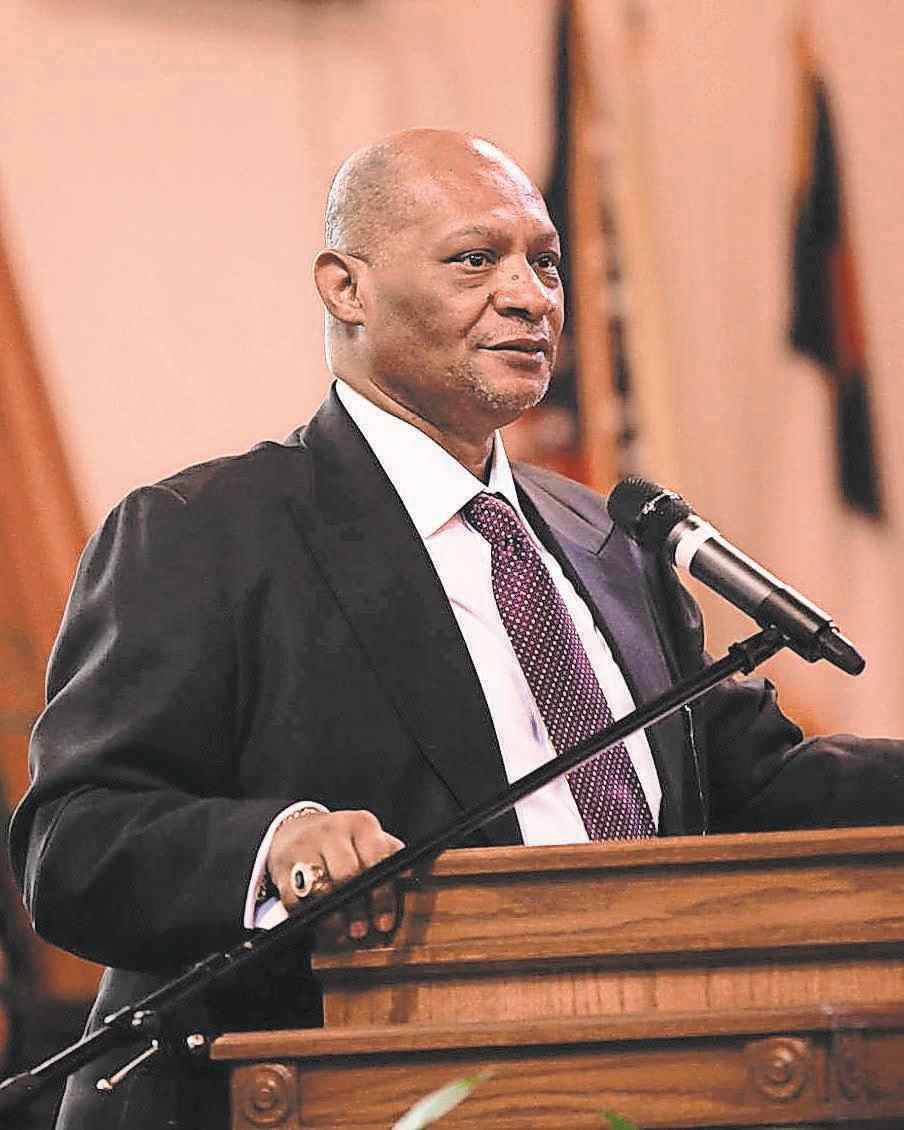
groceries already cost more in our neighborhoods, this is nothing less than a manufactured hunger crisis.
Education is our country’s greatest path to opportunity. Yet, Trump wants to make it harder now for us to go to college and harder to stay. Federal student loan borrowing is capped. Even deferment options for people facing hardship are being removed. For Black students–lready carrying the highest loan burdens in the nation–this is a financial noose tightening around our future’s necks.
Meanwhile, environmental rollbacks also target us. When Trump guts clean energy tax breaks, it doesn’t hurt areas like Aspen—it hurts Houston’s Fifth Ward. It hurts every community already choking on diesel fumes and flooding from hurricanes. As we saw just last weekend in Texas, these aren’t “developing issues”—they’re daily realities. We live in what researchers call “sacrifice zones,” and this bill is asking us to sacrifice even more.
afford to wait. This is not some bad week on the campaign trail.
This is a multi-front assault on Black life, Black futures and Black dignity.
Thankfully, not everyone has adopted Carville’s perspective.
Specifically, we should commend the legislative floor actions of Sen. Cory Booker (D-N.J.) and House Democratic Leader Hakeem Jeffries (D-N.Y.), but we must do far more.
The silence from some corners of the Democratic Party has been just as dangerous as Trump’s actions and policy. We are tired of the urgent social media posts, the talking points showcased on MSNBC, and the texts asking for donations. You can’t build public will if you don’t mobilize. Where is the educational campaign? Where are the town halls? Why haven’t we seen coordinated messaging across communities most at risk? Why is it always up to pastors and parents to carry the burden of explaining what’s coming?
fervor, serving the Lord.” James 2:17 reminds us, “Faith without works is dead.” This isn’t just about policy—it’s about our moral obligation to act. Our churches must rise now. Our people must organize now. We need voter registration drives, policy teach-ins and loud, public pressure on every member of Congress—Democrats and Republicans alike. We need our young people, our elders, our workers and our warriors. We need a mass moral movement that makes clear: If you target our survival, we will target your seat.
So, with all due respect to the strategists, the pollsters, and the professional rope-a-dopers—no. We will not sit back and let Donald Trump swing freely while our communities get battered. We will not play dead while he dismantles the progress we’ve made since the days of Martin Luther King, Malcolm X and John Lewis.
class. And, again, Black folks are in the crosshairs. Let’s start with health care.
Medicaid, which covers 3 of 5 Black children and 1 in 5 Black adults, is over as we know it. Trump has tied eligibility to an 80-hour-per-month work requirement—as if our people aren’t already working multiple jobs, caregiving, managing disabilities and grinding through structural barriers every single day. Add in co-pays and administrative burdens
and what you’re left with is a system designed to kick people off, not bring them in. Nearly 12 million Americans are at risk of losing Medicaid coverage, and you’d better believe we’ll be first in line.
Then there’s food assistance. The Supplemental Nutrition Assistance Program (SNAP) helps nearly 30 percent of Black households keep food on the table. Trump’s budget doesn’t just cut it—it guts it. A 30 percent reduction. In a country where
And let me not forget civil rights enforcement. Trump has starved the Justice Department’s Civil Rights Division, the same office tasked with investigating voter suppression, housing discrimination and racist policing.
This One Big Bill is not “beautiful.” It closes doors– specifically on Black Americans.
Even if Carville is right and in three years voters throw Trump and his racist MAGA party out of office, I fear we will be too late, that the doors that are being shut before our eyes will be deadbolted and the keys thrown away.
So no, Mr. Carville, we cannot
By Dr. Rasheem
In May 2025, Gov. Wes Moore of Maryland vetoed a bill that would have established a commission to study reparations for descendants of enslaved Africans in the state. The bill, modeled after similar initiatives nationwide, sought to create a structured, scholarly and community-informed pathway for understanding and repairing the historical and ongoing harms of slavery. Gov. Moore—Maryland’s first Black governor—justified his veto by arguing that the state does not need more study but rather immediate action.
While this stance may appear progressive on its surface, it ultimately undermines the complex and necessary groundwork required for sustainable and equitable reparative justice. By rejecting the creation of a reparations study commission, Gov. Moore missed a critical opportunity to deepen public understanding, build consensus and develop a robust, transparent implementation strategy for reparations in Maryland.
The limits of existing scholarship
While there is a growing body of literature on the moral and economic justifications for reparations, much of the scholarship stops short of articulating actionable implementation models at the state level.
Foundational texts like “From Here to Equality” by William Darity Jr. and A. Kirsten Mullen and the influential work of Ta-Nehisi Coates in “The Case for Reparations” offer historical context, economic rationale and
moral arguments, but they are not substitutes for local policy infrastructure. They do not provide granular details on how Maryland, with its unique history of slavery, segregation and racialized disinvestment, should structure and distribute reparative resources.
Moreover, while these texts argue convincingly that reparations are owed, they are often conceptual rather than logistical. They are national in scope and not tailored to the specific needs and disparities in housing, health care, education and criminal justice found within Maryland’s Black communities. Without a Maryland-specific commission, the state is left without a framework to translate broad reparations principles into local policy solutions. Therefore, to assert that there is no need for further study ignores the gap between theory and practice—between scholarship and the scaffolding necessary for policy design.
The danger of acting without a plan
Reparations is not a one-size-fitsall initiative. It must account for intergenerational trauma, structural inequality and the lived experiences of Black Marylanders across regions, age groups and class lines. Gov. Moore’s call to “act now” implies that the moral clarity of reparations should immediately translate into policy.
By vetoing the bill, Gov. Moore has placed the state in a paradox: he claims urgency but offers no public framework for how reparations will be realized. No roadmap, no
timelines, no transparent process. The danger here is twofold. First, bypassing the study phase could lead to ill-prepared programs that fail to meet community needs or that misallocate resources. Second, the absence of a commission excludes the very communities meant to benefit from reparations from participating in shaping the policies that would repair their own harm. This undermines principles of democratic participation and racial equity.
The role of study in movementbuilding and accountability Study is not synonymous with delay. It is a necessary phase in policy development, especially when the goal is to dismantle centuries-old systems of racial harm. A reparations commission would offer Maryland a structured way to:
• Review state and local policies that sustained racial inequities post-slavery,
• Calculate the economic impact of slavery and its afterlives in Maryland, Identify specific forms of repair, from direct payments to institutional reform and Recommend mechanisms for accountability, oversight and long-term impact.
Without this, the state’s approach to reparations remains vague, vulnerable to political whim, and likely to underdeliver on its transformative promise. Maryland could have added valuable data and insights to the national conversation by leading with research-driven implementation planning.
What happens while we wait? Medicaid vanishes. SNAP collapses. Our students drop out. Our families go hungry. And by the time the strategists say “now’s the time,” there might be nothing left to fight for.
Blacks know this playbook. We’ve seen what happens when Black people are told to wait.
We waited during Reconstruction and witnessed its dismantling. We waited during Jim Crow and buried our children.
We waited during Katrina and watched the water rise.
Our faith doesn’t give us the option to sit this out. Romans 12:11 says, “Never be lacking in zeal, but keep your spiritual
We will rise, and we will resist. Not because it’s convenient. Not because it’s strategic. But because it is necessary. Because our lives depend on it. And because, with God’s help, we still believe in a future worth fighting for.
It has been four months since Carville suggested the rope-adope strategy. We have seen the outcomes, and we have waited long enough. We are fighting a true-life Rumble in the Jungle for our great democracy, and we do not have the time to allow this fight to go the distance.
Like Muhammad Ali in Zaire, it is time to unleash a flurry of punches that will bring an eighth-round knockout victory.

This week, she speaks to Maryland Gov. Wes Moore’s decision to veto a reparations study bill.
Conclusion
Gov. Moore’s veto of the reparations study commission is a missed opportunity for principled leadership rooted in intentionality. By rejecting the bill, Gov. Moore has effectively dismissed the residents who understand that reparations is not just about redistribution—it is about repair, and a reimagining of the social contract.
A reparations commission would not
have stalled progress; it would have fortified it. In the absence of such a body, calls to “act now” ring hollow, as they are not backed by a transparent, participatory, or evidence-based plan. For Maryland to truly lead the nation in reckoning with the legacy of slavery, it must move wisely, and with the full weight of history, community insight and public accountability behind it.

SUPERIOR COURT OF THE DISTRICT OF COLUMBIA PROBATE DIVISION ADMINISTRATION NO. 2024ADM000694
ANTHONY B. WOODARD Name of Decedent
DIANN DAWSON, ATTORNEY 2101 STEUBEN WAY SILVER SPRING, MD 20905 Notice of Appointment, Notice to Creditors and Notice to Unknown Heirs
believed to be heirs or legatees of the decedent who do not receive a copy of this notice by mail within 25 days of its publication shall so inform the Register of Wills, including name, address and relationship. Date of first publication: JULY 25, 2025 Name of newspaper and/or periodical: Washington Law Reporter AFRO American Newspapers
STEVEN-PAUL WOODARD, whose address is 14800 CARROLTON ROAD, ROCKVILLE, MD 20853 was appointed Personal Representative of the estate of ANTHONY B. WOODARD who died on MARCH 15, 2025 without a Will and will serve without Court supervision. All unknown heirs and heirs whose whereabouts are unknown shall enter their appearance In this proceeding. Objections to such, appointment shall be filed With the Register of Wills, D.C., Building A, 515 5th Street, N.W., 3rd Floor, Washington, D.C. 20001, on or before JANUARY 25, 2026. Claims against the decedent shall be presented to the undersigned with a copy to the Register of Wills or filed with the Register of Wills with a copy to the undersigned, on or before JANUARY 25, 2026 or be forever barred. Persons believed to be heirs or legatees of the decedent who do not receive a copy of this notice by mail within 25 days of its publication shall so inform the Register of Wills, including name, address and relationship. Date of first publication: JULY 25, 2025 Name of newspaper and/or periodical: Washington Law Reporter AFRO American Newspapers
STEVEN-PAUL WOODARD
Personal Representative
TRUE TEST COPY REGISTER OF WILLS 07/25, 08/01, 08/08/25
SUPERIOR COURT OF THE DISTRICT OF COLUMBIA PROBATE DIVISION ADMINISTRATION NO. 2025ADM000721
FIRM
LEE JOHN SMITH
of Decedent
STELLANO L. SIMMONS PLLC/SELLANO L. SIMMONS
D STREET NW, SUITE
WASHINGTON, DC 20001 Notice of
Washington, D.C. 20001, on or before FEBRUARY 01, 2026. Claims against the decedent shall be presented to the undersigned with a copy to the Register of Wills or filed with the Register of Wills with a copy to the undersigned, on or before FEBRUARY 01, 2026 or be forever barred. Persons believed to be heirs or legatees of the decedent who do not receive a copy of this notice by mail within 25 days of its publication shall so inform the Register of Wills, including name, address and relationship.
Date of first publication: AUGUST 01, 2025
Name of newspaper and/or periodical: Daily Washington Law Reporter AFRO American Newspapers
MONELLE SMITH Personal Representative TRUE TEST COPY REGISTER OF WILLS 08/01, 08/08, 08/15/25

PATRICIA HENRY Name of Decedent Notice of Appointment, Notice to Creditors and Notice to Unknown Heirs
JAMES HENRY, whose address is 2540 SOUTHERN AVE SE APT 11, WASHINGTON, DC 20020 was appointed Personal Representative of the estate of PATRICIA HENRY who died on SEPTEMBER 13, 1996 without a Will and will serve (with/without) Court supervision. All unknown heirs and heirs whose whereabouts are unknown shall enter their appearance In this proceeding. Objections to such, appointment shall be filed With the Register of Wills, D.C., Building A, 515 5th Street, N.W., 3rd Floor, Washington, D.C. 20001, on or before JANUARY 25, 2026. Claims against the decedent shall be presented to the undersigned with a copy to the Register of Wills or filed with the Register of Wills with a copy to the undersigned, on or before JANUARY 25, 2026 or be forever barred. Persons believed to be heirs or legatees of the decedent who do not receive a copy of this notice by mail within 25 days of its publication shall so inform the Register of Wills, including name, address and relationship. Date of first publication: JULY 25, 2025 Name of newspaper and/or periodical: Washington Law Reporter AFRO American Newspapers
JAMES HENRY
Personal Representative
TRUE TEST COPY REGISTER OF WILLS 07/25, 08/01, 08/08/25
SUPERIOR COURT OF THE DISTRICT OF COLUMBIA PROBATE DIVISION 2025ADM752 Estate of ANNIE K. GOULD Deceased NOTICE OF STANDARD PROBATE (For estates of decedents dying on or after July 1, 1995)
Notice is hereby given that a petition has been filed in this Court by ANITA J. GOULD AND JUANITA O. LOGAN for standard probate, including the appointment of one or more personal representatives. Unless a responsive pleading in the form of a complaint or an objection in accordance with Superior Court Probate Division Rule 407 is filed in this Court within 30 days from the date of first publication of this notice, the Court may take the action hereinafter set forth admit to probate the will dated DECEMBER 1, 2010 exhibited with the petition upon proof satisfactory to the Court of due execution by affidavit of the witnesses or otherwise * in the absence of a will or proof satisfactory to the Court of due execution, enter an order determining that the decedent died intestate * appoint an unsupervised personal representative
Date of first publication: JULY 25, 2025 Names of newspapers: Daily Washington Law Reporter AFRO American Newspapers
ANITA J. GOULD JUANITA O. LOGAN 12000 TRADITIONS BLVD, BOWIE, MD 20720 11389 LAGER BLVD, UNIT 1, FULTON, MD 20759 Signature of Petitioner/Attorney Register of Wills Clerk of the Probate Division 07/25, 08/01/25

SUPERIOR COURT OF THE DISTRICT OF COLUMBIA PROBATE DIVISION 2025FEP000085 JANUARY 06, 2025 Date of Death DARION MILLER GRIFFIN AKA DARION M. GRIFFIN Name of Decedent
NOTICE OF APPOINTMENT OF FOREIGN
PERSONAL REPRESENTATIVE AND NOTICE TO CREDITORS
WILLIAM D. MILLER whose address is 6100 WHITTEMORE COURT, UPPER MARLBORO, MARYLAND 20772 was appointed representative of the estate of DARION MILLER GRIFFIN AKA
DARION M. GRIFFIN
deceased, by the ORPHAN’S Court for MONTGOMERY County, State of MARYLAND, on MARCH 20, 2025. Service of process may be made upon CECILLIA R. JONES & ASSOCIATES, PLLC 5335 WISCONSIN AVE. NW SUITE 440 WASHINGTON, DC 20015 whose designation as District of Columbia agent has been filed with the Register of Wills, D.C. The decedent owned the following District of Columbia real property: 1928 KEARNEY STREET NE WASHINGTON,DC 20018. Claims against the decedent may be presented to the undersigned and filed with the Register of Wills for the District of Columbia, Building A, 515 5th Street, N.W., 3rd Floor, Washington, D.C. 20001 within 6 months from the date of first publication of this notice.
Date of first publication: AUGUST 01, 2025 Name of newspaper, and/or periodical: Daily Washington Law Reporter AFRO-American
WILLIAM D. MILLER Personal Reperesenative
TRUE TEST COPY REGISTER OF WILLS 08/01, 08/08, 08/15/25
SUPERIOR COURT OF THE DISTRICT OF COLUMBIA PROBATE DIVISION ADMINISTRATION NO. 2024ADM0096 ROBERT WOODROW MURPHY Name of Decedent
DONALD M. TEMPLE, ESQ. 2522 VIRGINIA AVE., NW, SUITE B WASHINGTON, DC 20037 Notice of Appointment, Notice to Creditors and Notice to Unknown Heirs JANET SHEEN, whose address is 4713 WISCONSIN AVE., NW, WASHINGTON, DC 20016 was appointed Personal Representative of the estate of ROBERT WOODROW MURPHY who died on NOVEMBER 26, 2023 without a Will and will serve without Court supevision. All unknown heirs and heirs whose whereabouts are unknown shall enter their appearance In this proceeding. Objections to such, appointment shall be filed With the Register of Wills, D.C., Building A, 515 5th Street, N.W., 3rd Floor, Washington, D.C. 20001, on or before JANUARY 25, 2026. Claims against the decedent shall be presented to the undersigned with a copy to the Register of Wills or filed with the Register of Wills with a copy to the undersigned, on or before JANUARY 25, 2026 or be forever barred. Persons believed to be heirs or legatees of the decedent who do not receive a copy of this notice by mail within 25 days of its publication shall so inform the Register of Wills, including name, address and relationship. Date of first publication: JULY 25, 2025 Name of newspaper and/or periodical: Washington Law Reporter AFRO American Newspapers
JANET SHEEN Personal Representative TRUE TEST COPY REGISTER OF WILLS 07/25, 08/01, 08/08/25
SUPERIOR COURT OF THE DISTRICT OF COLUMBIA PROBATE DIVISION ADMINISTRATION NO. 2024ADM000719 VERNON MONTA BROWN Name of Decedent CHARLES E. WALTON, ESQ. 10905 FORT WASHINGTON ROAD, SUITE 201 FORT WASHINGTON, MARYLAND 20744 Notice of Appointment, Notice to Creditors and Notice to Unknown Heirs
SHERMANITA ISLER, whose address is 705 TRENARY CIRCLE, FORT WASHINGTON, MD 20744 was appointed Personal Representative of the estate of VERNON MONTA BROWN who died on JANUARY 5, 2024 without a Will and will serve without Court supervision. All unknown heirs and heirs whose whereabouts are unknown shall enter their appearance In this proceeding. Objections to such, appointment shall be filed With the Register of Wills, D.C., Building A, 515 5th Street, N.W., 3rd Floor, Washington, D.C. 20001, on or before JANUARY 25, 2026. Claims against the decedent shall be presented to the undersigned with a copy to the Register of Wills or filed with the Register of Wills with a copy to the undersigned, on or before JANUARY 25, 2026 or be forever barred. Persons believed to be heirs or legatees of the decedent who do not receive a copy of this notice by mail within 25 days of its publication shall so inform the Register of Wills, including name, address and relationship. Date of first publication: JULY 25, 2025 Name of newspaper and/or periodical: Washington Law Reporter AFRO American Newspapers
SUPERIOR COURT OF THE DISTRICT OF COLUMBIA PROBATE DIVISION ADMINISTRATION NO. 2025ADM000729 KIRK DARDEN DAVIS Name of Decedent WILLIAM A. BLAND, ESQUIRE 80 M STREET SE #330 WASHINGTON, DC 20003 Notice of Appointment, Notice to Creditors and Notice to Unknown Heirs
KIMBERLY R. DAVIS, whose address is 725 TUCKERMAN STREET NW WASHINGTON, DC 20011 was appointed Personal Representative of the estate of KIRK DARDEN DAVIS who died on AUGUST 02, 2024 without a Will and will serve without Court supervision. All unknown heirs and heirs whose whereabouts are unknown shall enter their appearance In this proceeding. Objections to
NOTICE OF PUBLIC HEARING AND COMMENT PERIOD FOR DCHA’S AMENDED FISCAL YEAR 2026 MOVING TO WORK (MTW) PLAN
The District of Columbia Housing Authority (DCHA) is providing notice of a Public Hearing and Comment Period to solicit comments on an amendment to the Fiscal Year 2026 Moving to Work (MTW) Annual Plan. Visit DCHA’s MTW Webpage at https://www.dchousing.org/mtw to:
• Download a copy of the Amended FY26 MTW Annual Plan
• Download a summary of the Amended FY26 MTW Annual Plan
You can also request a copy by emailing mtw@dchousing.org or calling 771-240-4377.
The Virtual Public Hearing for the Amended FY26 MTW Annual Plan will take place online at 5:30 p.m. on Wednesday, August 20.
To speak during the Virtual Public Hearing, register online at https://bit.ly/RegisterMTWPublicHearing
To join the live event, at 5:30 p.m. on Wednesday, August 20, please visit https://bit.ly/MTWPublicHearing. This event will also be live streamed on the DCHA Facebook page at https://www.facebook.com/dchousing/.
Comments
Written comments regarding the Amended FY2026 MTW Annual Plan will be accepted through 11:59 p.m. on Thursday, August 28. Email your comments to mtw@dchousing.org.
Alternatively, you can mail comments to:
District of Columbia Housing Authority Office of the Executive Director Attn: MTW Policy Director 300 7th Street, SW 11th Floor Washington, DC 20024
Requesting a Reasonable Accommodation
DCHA strives to host inclusive, accessible events that enable all individuals, including individuals with disabilities, to engage fully. It is the policy of DCHA that all agency-sponsored public meetings and events are accessible to people with disabilities. DCHA is committed to providing equal access to events for all participants & residents with disabilities. If you need a reasonable accommodation, or assistance in participating in a meeting or event due to a disability as defined under the Americans with Disabilities Act, please contact our ADA/504 Program Office at 202-5351000 or at ADA504@dchousing.org with your complete request. Every reasonable effort will be made to meet your request.
If you need a sign language interpreter or foreign language interpretation or translation, please contact our Office of Customer Engagement at 202535-1000 or go to www.dchousing.org/language. Please allow at least 3 business days to make the necessary arrangements.

Payment Policy for legal notice advertisements.
Effective immediately, The Afro American Newspapers will require prepayment for publication of all legal notices Payment
accepted in the form of checks, credit card or money order. Any returned checks will be subject
a
and may result in the suspension of any future advertising at our discretion.
City of Baltimore Department of Finance Bureau of Procurement
Sealed proposals addressed to the Board of Estimates of Baltimore will be Received until, but not later than 11:00 am local time on the following dates for the stated requirements.
August 13, 2025
•TOP SIGN MONITORING SYSTEMS-AUTHORIZTIONS of PILOT PROGRAM RFQ-000745
ENTIRE SOLICITATION CAN BE VIEWED AND DOWNLOADED BY VISITING THE WEBSITE: https://wd1.myworkdaysite.com/supplier/baltimorecity/ SupplierSite


HOUSING AUTHORITY OF BALTIMORE CITY REQUEST FOR PROPOSALS REMOTE RECERTIFICATION FOR HOUSING CHOICE VOUCHER PROGRAM
RFP NUMBER: B-2046-25
The Housing Authority of Baltimore City (“HABC”) will issue a Request for Proposals (“RFP”) for interested and qualified firms provide professional services to assist with processing recertification transactions as part of the Housing Choice Voucher Program (HCVP). The selected vendor will be responsible for managing the recertification process effectively, ensuring compliance with the local and federal regulations and HCVP Administrative Plan.
PROPOSALS WILL BE DUE no later than 2:00 p.m. Eastern Time on Friday, August 29, 2025
A non-mandatory pre-proposal conference will be held on Wednesday, August 13, 2025 at 11:00 a.m., which will be scheduled as a virtual meeting.
The entire RFP can be viewed and downloaded by visiting https://habc. bonfirehub.com/projects on or after Monday, August 4, 2025.
Questions regarding the RFP should be directed in writing to the address and individual indicated below and must include the reference: HABC RFP Number B-2034-25.
Housing Authority of Baltimore City Division of Fiscal Operations, Procurement Department Attention: Mary Kate Gagliardi, Senior Buyer Tel: (410) 396-3105 mary.gagliardi@habc.org






















